
How to Pull Off Your Thesis Defense With a Great Presentation

You’ve reached the home stretch in your journey toward your post-graduate degree. You’ve diligently studied, researched and performed for years, and all that’s left is your master thesis or doctorate dissertation.
“ All that’s left,” however, might be the understatement of the century. There’s nothing simple about orally defending your thesis, and this final stage often means the difference between a degree and a program that remains incomplete.
Even after you’ve dedicated months filled with blood, sweat and tears defining your argument, researching your support and writing your defense, you aren’t ready to address the academic panel. You still have to design an effective visual presentation, and the slide deck can make or break your entire thesis.
Unsure how to design a stellar slide deck to visually present your thesis or dissertation? Check out the following tips to pull off your master thesis defense with a great presentation:
1. Properly structure your slide deck
Every master thesis defense presentation is unique, but most effective slide decks will follow a similar structure, including:
- Title - Just like a research paper, your thesis presentation must include a title slide. This should include the same information as any other title page: the title, your name, your academic institution, course name and the name of the academic advisor to your thesis or dissertation. That doesn’t mean your title slide needs to look like the start of any other Frankendeck . Instead, add your text atop a relative image, and adjust the brightness to ensure your text pops.
- Introduction - Your thesis presentation should also include an introduction slide, which details the topic of your thesis, the question your research will seek to answer and any additional objectives to your research, as well as the answer or solution you will be defending.
- Literature review - Following your thesis introduction, design one or more slides that review the literature you researched. This shouldn’t be a full bibliography (although that should be included in the accompanying written account of your research), but instead, the slides should list your most relevant research sources. If the information is featured on a slide, make sure you include its source.
- Methodology - Your thesis presentation slide deck should also include a slide (or slides) detailing the methodology of your research and argument. Here you want to describe the type of study— whether it’s quantitative, qualitative or a combination of the two, as well as an explanation of why you chose the method or methods you used. If you conducted original research, you will want to detail the study population, sampling methods and other details pertinent to your studies, while you’ll also want to detail how you analyzed your data.
- Results - No thesis presentation slide deck is complete without dedicating slides to illustrate the results of your research. Be sure to include a description of any data you collected through your research, as well as the results of your analysis of the data. What were your most significant findings?
- Discussion - How do the results of your research support your overall thesis argument? Be sure to include slides that discuss your overall findings and how they relate to your original question.
- Conclusion - Concluding slides should restate your original research questions, represent the results of your research, suggest future research and make any final recommendations.
- Ending slide – Close your thesis presentation with a concluding slide that offers an interesting quote or trivia that makes your audience further ponder your topic, a GIF or animation that recaptures the audience’s attention or even a hypothetical question that opens additional discussion from the academic panel. This is your opportunity to make your presentation memorable.

Thesis Presentation vs. Dissertation
Thesis presentation and dissertation are two terms often used in academic settings related to upper education. While they are related, there are distinct differences between the two, which is important to understand as you begin to structure your thesis defense.
A thesis presentation typically refers to the final oral presentation that a student gives to defend their thesis or research project. It is a formal presentation to explain their findings, methodology, and conclusions to a panel of faculty members or experts in the field. The purpose of a thesis defense presentation is to demonstrate the student's knowledge and understanding of the subject matter and to defend the validity of their research.
On the other hand, a dissertation refers to a lengthy and comprehensive research project that is typically required for the completion of a doctoral degree. It involves in-depth research, analysis, and the development of original ideas in a particular field of study. A dissertation is usually written over an extended period and is expected to contribute new knowledge or insights to the field. Unlike a thesis presentation, a dissertation is submitted in written form and is typically evaluated by a committee of faculty members or experts in the field.
2. Choose which ideas to illustrate
Unless you have an hour to fill with your master thesis defense or doctorate dissertation, you won’t be able to include every idea from your overall research documentation in your slide show. Choose the most important ideas to illustrate on slides, while also keeping in mind what aspects of your research you’ll be able to visually represent.
.webp)
3. Define your presentation’s theme
A stellar thesis or dissertation presentation will be professional in appearance, and a cohesive design is an absolute must. Choose what types of typography and color schemes best support your topic.
Instead of adjusting these settings on each individual slide— a tedious task at best— choose a PowerPoint-alternative presentation software like Beautiful.ai that allows you to customize a theme for your entire slide deck. Choose your fonts and other typography, your color palette, margins, footers, logos, transitions and more, and the cloud-based tool will automatically apply those design specifications to every slide you add to the master thesis defense presentation.
4. Design simple and focused slides
You might have a lot of information to present, but when it comes to your thesis presentation— or almost any slide deck for that matter— less is more. Be sure every slide counts by focusing on your main points.
Then, whatever you do, keep your slides simple. Not even an academic panel is going to dedicate much time deciphering a cluttered slide with all too many details. Try to avoid presenting more than one or two ideas on each slide.
5. Include data visualizations
The whole point of your presentation is to illustrate the concepts included in your thesis. Humans are visual creatures and react strongly to imagery, and the panel evaluating your thesis or dissertation is no exception— regardless of how studious and formal the academics might seem. Illustrate the results of your research with colorful and engaging infographics . You don’t have to be a graphic designer to create them, either.
Beautiful.ai users can choose from a host of smart slide templates with data visualizations — including favorites like bar graphs and pie charts , as well as less common options like scattergraphs , flow charts and pictograms . Just input your data and watch as our special brand of artificial intelligence creates the infographic for you.
6. Practice makes perfect
After spending months researching your thesis or dissertation, writing about your findings and designing a stellar master thesis defense presentation, you would hate to see all your hard work be for naught. That’s still a distinct possibility, however, if you don’t also practice your delivery.
Practice, practice and practice some more until you know your master thesis defense like the back of your hand. No academic panel will be impressed by a graduate candidate who stumbles through their presentation or appears to be reading from their notes. Know the contents of every slide, as well as exactly what parts of your overall defense you want to deliver during its display.
Things to keep in mind to help you nail your presentation
The golden rule of any presentation is to keep your audience engaged. You can ensure a more engaging presentation by maintaining eye contact, using appropriate gestures, and speaking clearly. You can also choose to include the audience in your presentation with interactive questions, polls, and slides.
To help boost audience retention, utilize storytelling. Studies show that when facts are presented in the form of a story, people are 22 times more likely to remember them. Talk about powerful.
Last but not least, plan for questions— and not simply by allowing time for them. Watch other thesis defenses delivered at your institution, and consider what types of questions the academic panel might ask, so you can prepare the best possible answer.
Extra credit:
Get started with our PhD Defense Thesis presentation template here .

Samantha Pratt Lile
Samantha is an independent journalist, editor, blogger and content manager. Examples of her published work can be found at sites including the Huffington Post, Thrive Global, and Buzzfeed.
Recommended Articles

Present Beautifully: A 5-Step Guide to Standout Presentations

Master Event Marketing with Beautiful.ai: A Manager’s Guide
.webp)
5 Ways to Pitch Solar Energy Installation to Homeowners and Businesses

How To Ensure Your Team Finds and Uses The Right Content Always
These cookies are required for the website to run and cannot be switched off. Such cookies are only set in response to actions made by you such as language, currency, login session, privacy preferences. You can set your browser to block these cookies but this might affect the way our site is working.
These cookies are usually set by our marketing and advertising partners. They may be used by them to build a profile of your interest and later show you relevant ads. If you do not allow these cookies you will not experience targeted ads for your interests.
These cookies enable our website to offer additional functions and personal settings. They can be set by us or by third-party service providers that we have placed on our pages. If you do not allow these cookies, these services may not work properly.
These cookies allow us to measure visitors traffic and see traffic sources by collecting information in data sets. They also help us understand which products and actions are more popular than others.


Ace Your Thesis Defense: Proven Techniques To Defend Your Thesis
You’ve done the research, written the thesis, and now it’s time to defend your hard work in what could be the most significant academic presentation of your life.
Nervous? Don’t be.
This blog is designed to give you the insider tips and techniques that can help you sail through your thesis defense like a pro.
Whether you’re working towards a master’s or a Ph.D., understanding the nuances of a thesis defense can make all the difference.
Read on to find out how to prepare, what to expect, and how to impress your committee. With this guide, you’ll not only be well-prepared but may actually find yourself enjoying the experience.
What is a Thesis Defense?
A thesis defense is the culminating event in a graduate student’s academic journey, often compared to the “final boss” in a video game.
However, contrary to popular anxiety-inducing belief, it’s not a test; it’s more akin to a scholarly discussion.
After years of research and writing, students present their thesis to a committee made up of subject matter experts.
The purpose is to demonstrate expertise, defend research choices, and prove that they have made a contribution to their field.
What Does a Thesis Defense Look Like?
Students should expect to give an initial presentation, followed by a Q&A session where committee members probe further. It can go on for up to 3+ hours.
Typically there are external experts in a particular field who have read the thesis and have now attended your university to watch your presentation and ask you questions about it. It can be done in a public forum or privately in a closed room.
Expect queries that dig into your methodology, specific results, and how your work advances the current body of knowledge.
Once you have answered the questions the candidate is often asked to leave the room while the experts deliberate – it can be quite an anxious wait.
Top tips from PhDs for a thesis defence – FAQs
- Read Your Thesis Again : Even if you think you’ve completed your thesis, allocate time to read it again to refresh your memory.
- Prepare for Open-Ended Questions : Your committee will ask questions that are usually open-ended and require deep understanding. Prepare answers in advance.
- Know the Purpose : Understand that the purpose of a thesis defense is to prove you’re an expert in your field, not to interrogate you.
- Conduct a Q&A Session : Practice a question and answer session with your advisor or a professor to prepare for possible questions.
- Time Management : Be aware that the length for a thesis defense can vary. Some may take only 20 minutes, so focus on main points.
- Public Speaking : Use this as a chance to hone your public speaking skills. Many graduate degree programs require an oral defense or practicum.
- Committee Members : Know who is on your committee and what they specialize in to anticipate the types of questions they might ask.
- Consult Your Advisor : Your advisor can give you an overview of what to expect, helping you feel more confident.
- Be Ready for Formalities : Realize that the defense is a formal academic formality; it’s not only a presentation but also an evaluation of your ability to think critically.
- Understand the Evaluation : Your defense isn’t just about defending a thesis; it’s also about showing you can contribute to the existing body of knowledge in your graduate program.
- Prepare for Varied Questions : Questions may cover everything from your thesis topic to your research methods, so be prepared for a wide range.
- Think of It as a Job Interview : Like a job interview, your thesis defense gives you a chance to show your expertise. Be as prepared as possible.
How to Prepare for Your Thesis Defense
When it comes to prepping for your thesis defense, organization and mindset are crucial.
Sure, you’ve spent months, if not years, researching and writing your thesis, but now it’s time to defend it in front of your committee. One insider tip is to treat the defense as a “discussion,” not a “test.” Your thesis committee is there to engage in an academic conversation with you; they’re not looking to trip you up.
One golden nugget of advice is to print out a copy of your thesis, but not just any printout will do.
Create a “defense-friendly” format, complete with tabs marking significant sections and even color-coding if you’re a visual person.
The point is to make the document easy to navigate during the defense when your committee members ask questions you need to address promptly.
Beyond having the thesis itself in hand, go the extra mile and print out five or fewer key pages that may be the subject of focused discussion.
This can include graphs or data that didn’t make it into the final thesis but could still be relevant. For instance, one student printed out a large-scale version of a critical diagram from their thesis and had it ready when committee members inevitably asked about it.
The committee was impressed, and it made for a smoother defense.
To prepare, make sure you’ve allotted sufficient time for the process—ten days is a good benchmark. Take one day to review your thesis in its entirety and then a few days for each chapter. Revisit literature, anticipate questions, and try to see your work from the committee’s perspective.
Make use of prep templates available online, which can help you consider your thesis’ different parts in-depth. So when D-Day comes, you’re not just prepared; you’re defense-ready.
My Experience with a Thesis Defense
When it came time for my thesis defense, I was a bundle of nerves despite having practiced extensively.
I had simulated the entire defense multiple times with friends and even consulted my advisor for last-minute tips. To my surprise, the questions posed by the committee weren’t as hard as I had anticipated.
They seemed to flow naturally from the work I had done, and my extensive preparation made it easier to respond confidently. The time during the defense passed more quickly than I had imagined, adding to the sense of flow.
What was unexpected was how much I actually enjoyed the experience. The defense turned into a meaningful academic conversation, making me feel like a genuine expert in my field.
Wrapping up – prepare for a thesis defense
Defending your thesis is a significant milestone, whether you’re aiming for a master’s degree or pushing the boundaries of academia with a Ph.D. It’s the culmination of your hard work, the moment you demonstrate that you’ve written a good thesis and are ready to join the ranks of the experts in your field. For many students, the experience can be nerve-wracking, but as you’ve seen in this blog, it doesn’t have to be.
From understanding the type of thesis defense questions you may encounter to gaining insights into the formalities involved, you now have the tools to prepare for a thesis defense effectively. The aim is not just to survive but to thrive, turning your defense into an enlightening academic conversation.
Your defense is more than just a hurdle to overcome; it’s an opportunity to showcase your research, your understanding, and your ability to contribute to your field. You’ve spent years preparing for this moment—take the time to prepare a little more, and the experience could be rewarding in ways you never expected.

Dr Andrew Stapleton has a Masters and PhD in Chemistry from the UK and Australia. He has many years of research experience and has worked as a Postdoctoral Fellow and Associate at a number of Universities. Although having secured funding for his own research, he left academia to help others with his YouTube channel all about the inner workings of academia and how to make it work for you.
Thank you for visiting Academia Insider.
We are here to help you navigate Academia as painlessly as possible. We are supported by our readers and by visiting you are helping us earn a small amount through ads and affiliate revenue - Thank you!

2024 © Academia Insider

Like what you're reading?
How to create a great thesis defense presentation: everything you need to know
Get your team on prezi – watch this on demand video.
Anete Ezera April 13, 2024
Ready to take on your thesis defense presentation? It’s not just about wrapping up years of study; it’s your moment to share your insights and the impact of your work. A standout presentation can make all the difference. It’s your chance to highlight the essentials and really connect with your audience.
This is where Prezi comes into play. Forget about flipping through slide after slide. With Prezi, you craft a narrative that pulls your audience in. It simplifies the complex, ensuring your key points hit home. Let’s explore how Prezi can help transform your thesis defense into a successful presentation.

What is a thesis defense presentation and why are they needed?
Whether you’re preparing for a master’s thesis defense or a Ph.D. thesis defense, this final step in your academic journey is the one with the most significance, as it dramatically influences your final grade. It’s also your chance to display the dedication and effort you’ve put into your research, a way to demonstrate how significant your work is.
So, why is this such a big deal? A good presentation helps convince your teachers that your research is solid and makes a difference in your field. It’s your time to answer questions, show that your research methods were sound, and point out what’s new and interesting about your work. In the end, a great thesis defense presentation helps you finish strong and makes sure you leave a lasting impression as you wrap up this chapter of your academic life.
Best practices for making a successful thesis defense presentation
In order to craft a standout thesis defense presentation, you need to do more than just deliver research findings. Here are some key strategies to ensure success, and how Prezi can play a crucial role in elevating your presentation.
Start with a strong introduction
Kick-off with an engaging introduction that lays out your research question, its significance, and your objectives. This initial segment grabs attention and sets the tone. Using Prezi’s zoom feature can make your introduction pop by visually underscoring key points, helping your audience grasp the importance of your work right from the start.
Organize your presentation clearly
A coherent structure is essential for guiding your audience through your thesis defense presentation. Prezi can help by offering a map view of your content’s layout upfront, providing a clear path through your introduction, methodology, results, and conclusion. This clarity keeps your audience engaged and makes your arguments easier to follow.
Incorporate multimedia elements
Adding multimedia elements like videos, audio clips, and animations can greatly improve the appeal of your thesis defense presentation. Prezi supports the seamless integration of these elements, allowing you to bring your research to life in a more vibrant and engaging way. Videos can serve as powerful testimonials or demonstrations, while animations can help illustrate complex processes or changes over time. This variety keeps your audience engaged and helps convey your message in a more exciting way.

Simplify complex data
Your findings need to be presented in a way that’s easy for your audience to understand. Prezi shines here, with tools that transform intricate data into clear, engaging visuals. By implementing charts and graphs into your presentation, you can make your data stand out and support your narrative effectively.
Engage your audience
Make your thesis defense a two-way conversation by interacting with your audience. Whether it’s through questions, feedback, or direct participation, engagement is key. Prezi allows for a flexible presentation style, letting you navigate sections in response to audience input, creating a dynamic and engaging experience.
Highlight key takeaways
Emphasize the key takeaways of your research throughout your presentation to ensure your audience grasps the most critical aspects of your work. With Prezi, you can use spotlighting and strategic zooming to draw attention to these takeaways, making them stand out. This method helps reinforce your main points, ensuring they stick with your audience long after your presentation concludes. By clearly defining what your audience should remember, you guide their understanding and appreciation of your research’s value and implications.
Practice makes perfect
Confidence in delivery comes from thorough practice. Familiarize yourself with every aspect of your thesis defense presentation, including timing, voice control, and gestures. Prezi Video is a great tool for rehearsing, as it allows you to blend your presentation materials with your on-camera performance, mirroring the live defense setting and helping you polish your delivery.

End with a lasting impression
Conclude your presentation powerfully by summarizing your main findings, their implications, and future research directions. Prezi’s ability to zoom out and show the big picture at your conclusion helps reinforce how each section of your presentation contributes to your overall thesis, ensuring your research leaves a memorable impact on your audience.
By using these tips and taking advantage of what Prezi offers, you can make your thesis defense presentation really stand out. It’ll not only hit the mark with your audience but also clearly show why your research matters.
Meeting tight deadlines with Prezi
Facing a looming deadline for your thesis defense presentation? Prezi offers smart solutions to help you create a polished and engaging presentation quickly, even if it feels like you’re down to the wire.
A closer look at Prezi AI features
Prezi AI is a standout feature for those pressed for time. It assists in structuring your presentation efficiently, suggesting design elements and layouts that elevate your content. This AI-driven approach means you can develop a presentation that looks meticulously planned and executed in a fraction of the time it would normally take. The result? A presentation that communicates the depth and value of your research clearly and effectively, without the last-minute rush being evident. Here’s what Prezi AI can do:
- Streamlined creation process: At the core of Prezi’s efficiency is the AI presentation creator . Perfect for those last-minute crunch times, it’s designed to tackle tight deadlines with ease.
- Easy start: Kick off your presentation creation with just a click on the “Create with AI” button. Prezi AI guides you through a smooth process, transforming your initial ideas or keywords into a structured and visually appealing narrative.
- Visual impact: There’s no need to dive deep into design details. Simply provide some basic input, and Prezi AI will craft it into a presentation that grabs and holds your audience’s attention, making your thesis defense visually compelling.
- AI text editing: Spending too much time fine-tuning your message? Prezi AI text editing features can help. Whether you need to expand on a concept, clarify complex terms, or condense your content without losing impact, Prezi AI streamlines these tasks.
- Content refinement: Adjust text length for deeper explanation, simplify language for better understanding, and ensure your presentation’s content is precise and to the point. Prezi AI editing tools help you refine your message quickly, so you can focus on the essence of your research.
Using Prezi Video for remote thesis defense presentations
For remote thesis defenses, Prezi Video steps up to ensure your presentation stands out. It integrates your on-screen presence alongside your presentation content, creating a more personal and engaging experience for your audience. This is crucial in maintaining attention and interest, particularly in a virtual format where keeping your audience engaged presents additional challenges. Prezi Video makes it seem as though you’re presenting live alongside your slides, helping to simulate the in-person defense experience and keep your audience focused on what you’re saying.

Using these advanced Prezi features, you can overcome tight deadlines with confidence, ensuring your thesis defense presentation is both impactful and memorable, no matter the time constraints.
The Prezi experience: what users have to say
Prezi users have shared compelling insights on how the platform’s unique features have revolutionized their presentations. Here’s how their experiences can inspire your thesis defense presentation:
Storytelling with Prezi
Javier Schwersensky highlights the narrative power of Prezi: “This is a tool that is going to put you ahead of other people and make you look professional and make your ideas stand out,” he remarks. For your thesis defense, this means Prezi can help you craft a narrative that not only presents your research but tells a story that captures and retains the committee’s interest.
Flexibility and creativity
Tamara Montag-Smit appreciates Prezi for its “functionality of the presentation that allows you to present in a nonlinear manner.” This flexibility is key in a thesis defense, allowing you to adapt your presentation flow in real time based on your audience’s engagement or questions, ensuring a more dynamic and interactive defense.
The open canvas
Vitek Dočekal values Prezi’s open canvas , which offers “creative freedom” and the ability to “create a mind map and determine how to best present my ideas.” For your thesis defense, this means Prezi lets you lay out and show off your work in a way that makes sense and grabs your audience’s attention, turning complicated details into something easy and interesting to follow.
Engagement and retention
Adam Rose points out the engagement benefits of Prezi: “Being able to integrate videos is extremely effective in capturing their attention.” When you need to defend a thesis, using Prezi to include videos or interactive content can help keep your committee engaged, making your presentation much more memorable.
These real insights show just how effective Prezi is for crafting truly influential presentations. By incorporating Prezi into your thesis defense presentation, you can create a defense that not only shows how strong your research is but also leaves a lasting impression on your audience.
Thesis defense presentations for inspiration
Prezi is much more than a platform for making presentations; it’s a place where you can find inspiration by browsing presentations that other Prezi users have made. Not only that, but Prezi offers numerous templates that would be useful for thesis defense presentations, making the design process much easier. Here are a few examples that you may find helpful:
Research project template by Prezi
This Prezi research project template stands out as an ideal choice for thesis defense presentations due to its well-structured format that facilitates storytelling from start to finish. It begins with a clear introduction and problem statement, setting a solid foundation for the narrative. The inclusion of sections for user research, interviews, demographics, and statistics allows for a detailed presentation of the research process and findings, which are crucial when defending a thesis.
Visual elements like user mapping and journey maps help make complex information understandable and engaging, which is crucial for maintaining the committee’s attention. Additionally, addressing pain points and presenting prototypes showcases problem-solving efforts and practical applications of the research. The template culminates in a conclusion that ties everything together, emphasizing the research’s impact and future possibilities. Its comprehensive yet concise structure makes it an excellent tool for communicating the depth and significance of your work in a thesis defense.
Civil rights movement Prezi
This Prezi on the Civil Rights Movement exemplifies an effective thesis defense presentation by seamlessly blending structured content, multimedia enhancements, and dynamic navigation. It organizes information into coherent sections like “About,” “Key Events,” and “Key People,” offering a comprehensive view ideal for a thesis presentation. The strategic use of videos adds depth, providing historical context in a dynamic way that text alone cannot, enhancing the audience’s engagement and understanding.
Furthermore, Prezi’s open canvas feature brings the narrative to life, allowing for a fluid journey through the Civil Rights Movement. This method of presentation, with its zooming and panning across a virtual canvas, not only captivates but also helps to clarify the connections between various elements of the research, showcasing how to effectively communicate complex ideas in a thesis defense.
AI-assisted history template
This AI-assisted presentation template stands out as a great choice for thesis defense presentations, especially for those rooted in historical research. By merging striking visuals with rich, informative content, you can use this template to craft a narrative that breathes life into past events, guiding the audience on an engaging journey through time. Its sequential storytelling approach, empowered by Prezi AI , ensures a smooth transition from one historical point to the next, demonstrating the depth and continuity of your research. This template showcases Prezi AI’s capability to enhance narrative flow. By integrating advanced visuals and text, it captivates audiences and makes it an invaluable tool for presenting complex historical theses in a clear, compelling way.
Master your final grade with a Prezi thesis defense presentation
Preparing for a thesis defense, whether for a master’s or Ph.D., is a pivotal moment that significantly influences your final grade. It’s your platform to demonstrate the dedication behind your research and its importance in your field. A well-executed presentation convinces your educators of your research’s validity and your ability to bring fresh perspectives to light.
To craft a successful thesis defense presentation, Prezi’s innovative features can be a game-changer. Prezi can empower you to transform presentations into captivating stories and provide you with the flexibility and creative freedom needed to make your presentation an outstanding success. Incorporating videos or utilizing Prezi’s non-linear presentation style can keep your committee engaged and emphasize your research’s significance.
Prezi also serves as a hub of inspiration, offering templates perfect for thesis defenses. From structured research project templates to dynamic historical narratives, Prezi provides tools that communicate your thesis’s depth and significance effectively, ensuring you leave a memorable impact on your audience. So, it’s time to revamp your thesis defense presentation and change it from dull to inspirational with Prezi.

Give your team the tools they need to engage
Like what you’re reading join the mailing list..
- Prezi for Teams
- Top Presentations

The 10 Key Components of a Successful Thesis Defence Presentation
Sep 27, 2023 | Research FAQs
What are the Key Components of a Successful Thesis Defence Presentation?
The culmination of years of rigorous research, analysis, and academic dedication is often encapsulated in a single event – a successful thesis defence presentation. This pivotal moment in an academic journey can be both exhilarating and nerve-wracking. Success hinges on a well-prepared and effectively delivered presentation. In this comprehensive guide, we will delve into the key components of a successful thesis defence presentation, equipping you with the knowledge and insights necessary to navigate this critical milestone in your academic career.
10 Key Strategies To Defend Your Thesis
#1 clearly define your statement of thesis.
At the heart of every successful thesis defence presentation lies a well-articulated statement of thesis. This concise and focused sentence or two should encapsulate the core question or problem your research addresses. Peer review, a critical evaluation of your work by experts in the field, often commences with a thorough assessment of the clarity and relevance of your thesis statement. It is the compass that guides your entire presentation.

The statement of thesis serves as the cornerstone of an entire successful thesis defence presentation, and its importance cannot be overstated. This concise and focused sentence or two should encapsulate the core question or problem your research addresses. Think of it as the spark that ignites the intellectual journey you’re about to take your audience on.
When you consider the peer review process, it becomes clear that the experts in your field are like seasoned explorers, setting out on an intellectual expedition through your work. And where does their journey begin? With your thesis statement. It acts as the compass that guides their critical evaluation. They venture into the depths of your research, often commencing with a meticulous assessment of the clarity and relevance of your thesis statement. It’s not merely a formality; it’s a critical checkpoint to ensure that your compass is finely tuned and aligned with the path you’ve forged.
#2 Comprehensive Literature Review
A robust literature review demonstrates your understanding of the existing body of knowledge in your field. This component of your presentation should not merely summarise relevant literature but critically analyse it. Peer-reviewed journals, academic databases, and scholarly publications are invaluable resources for conducting a thorough literature review. Clearly demonstrate how your research fits into the existing landscape and adds a new dimension to the field.
Your literature review isn’t just a bibliography; it’s the evidence of your mastery over the existing body of knowledge in your field. It should be robust, showcasing your understanding and critical thinking abilities. Think of it as a treasure trove of insights from the minds of scholars who have paved the way before you.
Peer-reviewed journals, academic databases, and scholarly publications are the maps to this treasure trove. They are invaluable resources for conducting a thorough literature review. But remember, your role is not merely that of a summariser; you are an interpreter. Your presentation should not merely summarise relevant literature but critically analyse it. Imagine yourself as an art critic, dissecting each brushstroke to reveal the masterpiece that is your research. Show the audience how your research fits into the existing landscape and adds a new dimension to the field, like an artist contributing a unique piece to a gallery.
#3 Methodology and Data Collection
Describe in detail the methodologies employed in your research, addressing questions such as: How did you collect data? What tools or instruments did you use? How did you ensure the validity and reliability of your data? Peer review often scrutinises the rigor of your research methods, so be prepared to defend your choices and demonstrate their appropriateness for your study.
Your methodology is the blueprint of your research, and the data you collect are the bricks that build your thesis. This section deserves meticulous attention and clarity. Describe in detail the methodologies employed in your research. Address questions such as: How did you collect data? What tools or instruments did you use? How did you ensure the validity and reliability of your data? Think of it as the architectural plans that ensure your thesis stands tall and sturdy.
Keep in mind that peer review often scrutinises the rigor of your research methods. It’s like having a team of experienced builders inspecting your construction site for structural integrity. Be prepared to defend your choices and demonstrate their appropriateness for your study. You’re not just presenting data; you’re presenting the process behind the creation of your data.
#4 Data Analysis and Results
Present your findings with precision and clarity. Utilise graphs, tables, and visuals to enhance comprehension. Peer review experts will closely examine your data analysis methods to ensure they are statistically sound. Transparency in reporting results, including any limitations or unexpected outcomes, is crucial. Remember, transparency fosters credibility.
Your data is the treasure you’ve unearthed through your research, and it’s time to present it with precision and clarity. Visual aids like graphs, tables, and visuals should be your artistic tools. Imagine yourself as a storyteller, weaving a narrative with data points.

Peer review experts will closely examine your data analysis methods to ensure they are statistically sound. It’s akin to having statisticians double-check your calculations. Transparency in reporting results is paramount. Think of it as being transparent about the ingredients of a recipe; it fosters credibility. Be honest about any limitations or unexpected outcomes, just as a chef might explain a dish’s unique flavours. Transparency invites trust and understanding.
#5 Discussion and Interpretation
This is your opportunity to showcase your critical thinking skills. Discuss the implications of your findings in the context of your thesis statement and existing literature. Address any unanswered questions or areas for future research. Peer review experts will assess the depth of your analysis and the coherence of your interpretations.
This is the moment when your audience gets a glimpse of your critical thinking skills. It’s not just about presenting data; it’s about the story behind the data. Consider yourself a detective solving a complex mystery. Discuss the implications of your findings in the context of your thesis statement and existing literature.
Address any unanswered questions or areas for future research. This is your chance to engage your audience in a scholarly conversation. Peer review experts will assess the depth of your analysis and the coherence of your interpretations. Think of it as a roundtable discussion where your ideas are put to the test.
#6 Effective Presentation Skills
Engage your audience with effective presentation skills. Practice your delivery, ensuring that you maintain eye contact, speak clearly, and use appropriate gestures. A confident and composed demeanour goes a long way in conveying your expertise. Utilise visual aids sparingly and strategically to enhance, not overwhelm, your presentation.
As you step into the spotlight of your thesis defence presentation, imagine yourself as a performer on the academic stage. Engage your audience with effective presentation skills that not only convey your expertise but also hold their attention. Practice your delivery meticulously to ensure that you maintain eye contact, speak clearly, and use appropriate gestures.
Confidence is your best companion on this stage. A confident and composed demeanour goes a long way in conveying your mastery of the subject matter. Utilise visual aids sparingly and strategically to enhance, not overwhelm, your presentation. Think of them as props in a play, designed to complement your narrative, not steal the show.
#7 Anticipate and Address Questions
Be prepared for a barrage of questions from the thesis committee during and after your presentation. Anticipate potential queries based on your research and be ready to provide well-informed responses. Peer review often extends to this phase, assessing your ability to defend your research and engage in scholarly discourse.
The Q&A session during and after your presentation is a challenging yet essential phase. Imagine it as the part of your performance where the audience gets to interact with you directly. Be prepared for a barrage of questions from the thesis committee. Anticipate potential queries based on your research and be ready to provide well-informed responses.
Peer review often extends to this phase, assessing your ability to defend your research and engage in scholarly discourse. Think of it as a debate where you defend your thesis against the toughest opponents. Embrace questions as opportunities to showcase your expertise and deepen the understanding of your work.
#8 Time Management
Respect the allocated time for your presentation. Going over your time limit can be detrimental and reflects poorly on your preparation. Time management is a skill that not only demonstrates professionalism but also allows for a smoother and more focused presentation.
Time management is the conductor’s baton in the symphony of your presentation. It’s not just about keeping things on schedule; it’s about ensuring that your performance is harmonious and well-paced. Respect the allocated time for your presentation. Going over your time limit can be detrimental and reflects poorly on your preparation.
Think of your presentation as a well-rehearsed orchestral piece, with each section seamlessly flowing into the next. Time management is the key to orchestrating this performance effectively. It demonstrates professionalism and allows for a smoother and more focused presentation.

#9 Adaptability
Be ready to adapt to unforeseen circumstances or questions. Your ability to handle unexpected challenges with grace and knowledge can leave a positive impression on both your thesis committee and peer reviewers.
In the world of academia, as in life, surprises are inevitable. Be ready to adapt to unforeseen circumstances or questions. Your ability to handle unexpected challenges with grace and knowledge can leave a lasting positive impression on both your thesis committee and peer reviewers.
Think of this adaptability as the mark of a seasoned explorer who can navigate uncharted territory. The ability to pivot gracefully when faced with the unexpected demonstrates your resilience and expertise.
#10 Mock Defences and Feedback
Prior to your actual defence, conduct mock thesis defence presentations with peers or mentors. Seek constructive feedback to refine your presentation. This rehearsal process can help you identify areas that may require improvement and boost your confidence.
Before the curtain rises on your actual defence, consider the value of dress rehearsals in the world of theatre. Prior to your defence, conduct mock thesis defence presentations with peers or mentors. Seek constructive feedback to refine your presentation. This rehearsal process can help you identify areas that may require improvement and boost your confidence.
Think of these mock defences as a preview performance, an opportunity to fine-tune your act before the main event. Constructive feedback from trusted sources is like the guidance of seasoned directors, helping you polish your performance and ensure you’re ready for the spotlight.
In conclusion, a successful thesis defence presentation is a multifaceted performance that combines research expertise, effective communication, and adaptability. Each component plays a crucial role in shaping the narrative of your research journey. Just as a skilled performer prepares meticulously for a show, you too must invest time and effort in honing your skills and refining your presentation. Embrace the peer review process as a means to elevate your work and ensure it stands up to the scrutiny of the academic community. With these key components and a commitment to excellence, you’ll not only defend your thesis but also make a meaningful contribution to your field of study.
Key Tips To A Successful Thesis Defence
- Clear and Concise Thesis Statement : Craft a thesis statement that is clear, concise, and aligned with your research.
- Thorough Literature Review : Leave no stone unturned in your literature review to demonstrate your grasp of existing knowledge.
- Prepare for Questions : Anticipate questions and practice your responses to showcase your expertise.
- Practice and Timing : Practice your presentation and stick to the allotted time.
- Adaptability and Confidence : Stay adaptable and confident in the face of unexpected challenges.
The Building Blocks of a Successful Thesis Defence Presentation
In the realm of academia, the successful thesis defence presentation is a culmination of years of dedication, research, and scholarship. It is a testament to your expertise in your chosen field and your ability to contribute to the body of knowledge. Key components, such as a well-defined thesis statement, a comprehensive literature review, meticulous data analysis, and effective presentation skills, are the building blocks of a successful presentation.
Moreover, the engagement with peer review processes adds a layer of scrutiny that enhances the quality and credibility of your work. Embrace feedback, both during mock defences and from the thesis committee, as opportunities for growth and refinement.
As you embark on this academic journey, remember that a successful thesis defence presentation is not just a milestone but a stepping stone to a future where your research can make a significant impact. The key to success lies in meticulous preparation, effective communication, and a deep passion for your subject matter. With these components in place, you are well on your way to a successful thesis defence.
Useful Resources
Way With Words – Website: https://waywithwords.net/services/transcription-services . A reliable source for academic research transcription services, ensuring accuracy and professionalism in transcribing your research data.
Peer Review Process – Website: https://www.elsevier.com/reviewers/what-is-peer-review . Understand the peer review process and its significance in academic research.
Engagement Questions
As you prepare for a successful thesis defence, ask yourself:
- How can I best convey the significance of my research to both my thesis committee and the broader academic community?
- How can I use peer review feedback to strengthen my work?
- What are the key takeaways from my research that I want my audience to remember?
Remember that a successful thesis defence is not just about defending your research; it’s about sharing your passion and contributing to the academic discourse in your field. Embrace the journey, and you’ll emerge from it with a deeper understanding of your subject and a sense of accomplishment that comes from mastering this critical academic milestone.

PhD Dissertation Defense Slides Design: Start
- Tips for designing the slides
- Presentation checklist
- Example slides
- Additional Resources
Purpose of the Guide
This guide was created to help ph.d. students in engineering fields to design dissertation defense presentations. the guide provides 1) tips on how to effectively communicate research, and 2) full presentation examples from ph.d. graduates. the tips on designing effective slides are not restricted to dissertation defense presentations; they can be used in designing other types of presentations such as conference talks, qualification and proposal exams, and technical seminars., the tips and examples are used to help students to design effective presentation. the technical contents in all examples are subject to copyright, please do not replicate. , if you need help in designing your presentation, please contact julie chen ([email protected]) for individual consultation. .
- Example Slides Repository
- Defense slides examples Link to examples dissertation defense slides.
Useful Links
- CIT Thesis and dissertation standards
- Dissertations and Theses @ Carnegie Mellon This link opens in a new window Covers 1920-present. Full text of some dissertations may be available 1997-present. Citations and abstracts of dissertations and theses CMU graduate students have published through UMI Dissertation Publishing. In addition to citations and abstracts, the service provides free access to 24 page previews and the full text in PDF format, when available. In most cases, this will be works published in 1997 forward.
- Communicate your research data Data visualization is very important in communicating your data effectively. Check out these do's and don'ts for designing figures.
Power Point Template and other Resources
- CEE Powerpoint Slide Presentation Template 1
- CEE Powerpoint Slide Presentation Template 2
Source: CEE Department Resources https://www.cmu.edu/cee/resources/index.html
- CMU Powerpoint Slide Template
Source: CMU Marketing and Communications
https://www.cmu.edu/marcom/brand-standards/downloads/index.html
- Use of CMU logos, marks, and Unitmarks
Email me for questions and schedule an appointment

Top 7 tips for your defense presentation
1. show why your study is important, remember, your audience is your committee members, researchers in other fields, and even the general public. you want to convince all of them why you deserve a ph.d. degree. you need to talk about why your study is important to the world. in the engineering field, you also need to talk about how your study is useful. try to discuss why current practice is problematic or not good enough, what needs to be solved, and what the potential benefits will be. , see how dr. posen and dr. malings explained the importance of their studies..
- Carl Malings Defense Slides with Notes
- I. Daniel Posen Defense Slides with Notes
2. Emphasize YOUR contribution
Having a ph.d. means that you have made some novel contributions to the grand field. this is about you and your research. you need to keep emphasizing your contributions throughout your presentation. after talking about what needs to be solved, try to focus on emphasizing the novelty of your work. what problems can be solved using your research outcomes what breakthroughs have you made to the field why are your methods and outcomes outstanding you need to incorporate answers to these questions in your presentation. , be clear what your contributions are in the introduction section; separate what was done by others and what was done by you. , 3. connect your projects into a whole piece of work, you might have been doing multiple projects that are not strongly connected. to figure out how to connect them into a whole piece, use visualizations such as flow charts to convince your audience. the two slides below are two examples. in the first slide, which was presented in the introduction section, the presenter used a flow diagram to show the connection between the three projects. in the second slide, the presenter used key figures and a unique color for each project to show the connection..

- Xiaoju Chen Defense Slides with Notes
4. Tell a good story
The committee members do not necessarily have the same background knowledge as you. plus, there could be researchers from other fields and even the general public in the room. you want to make sure all of your audience can understand as much as possible. focus on the big picture rather than technical details; make sure you use simple language to explain your methods and results. your committee has read your dissertation before your defense, but others have not. , dr. cook and dr. velibeyoglu did a good job explaining their research to everyone. the introduction sessions in their presentations are well designed for this purpose. .
- Laren M. Cook Defense Slides with Notes
- Irem Velibeyoglu Defense with Notes
5. Transition, transition, transition
Use transition slides to connect projects , it's a long presentation with different research projects. you want to use some sort of transition to remind your audience what you have been talking about and what is next. you may use a slide that is designed for this purpose throughout your presentation. , below are two examples. these slides were presented after the introduction section. the presenters used the same slides and highlighted the items for project one to indicate that they were moving on to the first project. throughout the presentation, they used these slides and highlighted different sections to indicate how these projects fit into the whole dissertation. .

You can also use some other indications on your slides, but remember not to make your slides too busy. Below are two examples. In the first example, the presenter used chapter numbers to indicate what he was talking about. In the second example, the presenter used a progress bar with keywords for each chapter as the indicator.

Use transition sentences to connect slides
Remember transition sentences are also important; use them to summarize what you have said and tell your audience what they will expect next. if you keep forgetting the transition sentence, write a note on your presentation. you can either write down a full sentence of what you want to say or some keywords., 6. be brief, put details in backup slides , you won't have time to explain all of the details. if your defense presentation is scheduled for 45 minutes, you can only spend around 10 minutes for each project - that's shorter than a normal research conference presentation focus on the big picture and leave details behind. you can put the details in your backup slides, so you might find them useful when your committee (and other members of the audience) ask questions regarding these details., 7. show your presentation to your advisor and colleagues, make sure to ask your advisor(s) for their comments. they might have a different view on what should be emphasized and what should be elaborated. , you also want to practice at least once in front of your colleagues. they can be your lab mates, people who work in your research group, and/or your friends. they do not have to be experts in your field. ask them to give you some feedback - their comments can be extremely helpful to improve your presentation. , below are some other tips and resources to design your defense presentation. .
- Tips for designing your defense presentation
How important is your presentation, and cookies?

- Next: Tips for designing the slides >>
- Last Updated: Jan 9, 2024 11:18 AM
- URL: https://guides.library.cmu.edu/c.php?g=883178
Home Blog Presentation Ideas How To Do a Proper Thesis Defense Using the Right PowerPoint Presentation
How To Do a Proper Thesis Defense Using the Right PowerPoint Presentation
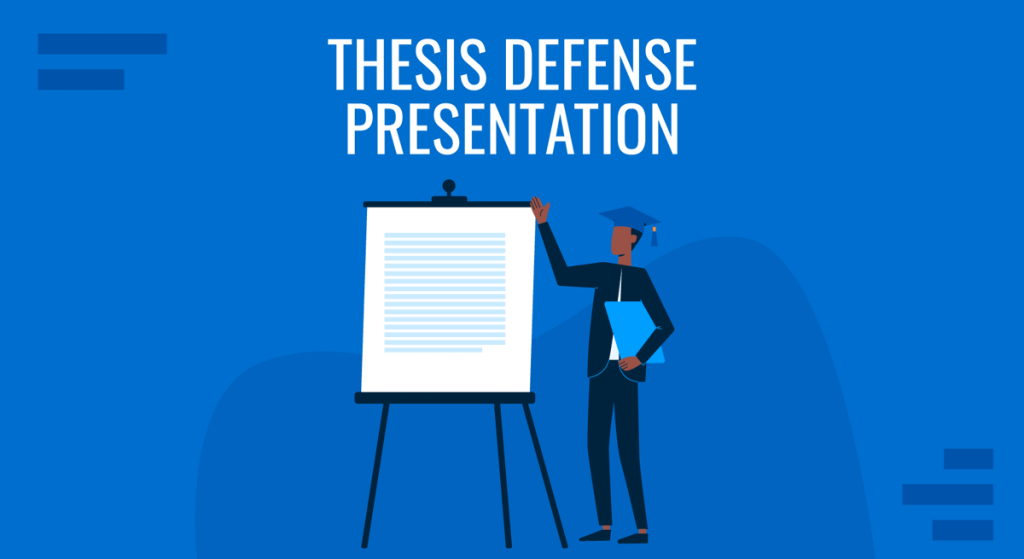
Writing a thesis is stressful, but preparing an oral defense can be even more painful. But it doesn’t have to be; with proper preparation and a good presentation, you will be able to better equip yourself comes time to present your thesis defense.
But what makes a good thesis defense?
A proper presentation helps you with your thesis defense because it helps you capture the panels’ attention and gives you cues and reminders on what to say as well.
It also helps keep your data organized while visually looking good and provides a flow structure for the rest of your presentation.
In today’s article, we will be giving you The Right PowerPoint Templates for Your Thesis Defense and a powerful outline composed of best practices and layouts specifically designed to help you defend your thesis in both written and oral presentations.
In the next segments of this article, we’ll walk you through the most feasible process on how to ace this kind of presentation.
Let’s dive into the outline of what makes a great thesis defense.
Thesis Defense Overview
Similarities.
- Type of Degree
Thesis and Dissertation Distinction Varies on Location
Three most common thesis defense myths, how to use chatgpt to structure your thesis.
- Introduction
- Literature Review
- Methodology
- Acknowledgements
- Questions and Answers
- Contact Information
- Tips During Your Oral Defense
- More Quick Tips on How to Present
A thesis defense is composed of two parts – a thesis and a defense.
The thesis, according to Grad School Hub , represents a student’s collective understanding of his or her program and major.
Universities often include a thesis in every course as one of the final requirements to earn a particular graduate or postgraduate degree.
The thesis, however, isn’t just a mere requirement.
It helps the students to grow out of their shell from their respective discipline and give them the opportunity to present all the findings of their study.
Moreover, some people think a thesis is just a long essay, but it’s not. Unlike an essay, a thesis needs to assert something.
This can be considered one of the most crucial research documents that a student makes during their academic schooling .
On the other hand, defense is the presentation of the pieces of evidence to support and prove your research.
It’s the most essential part of the thesis process.
Your presentation has to be prepared to answer questions from members of the committee and any other panel present, and it’s your job to convince them and defend your thesis with ample proof.
Prior to presenting, you have to carefully determine what appropriate evidence should be presented before the panel, depending on what thesis you have to defend.

Thesis and Dissertation Distinguished
A thesis or dissertation is usually required to complete a particular graduate degree. These two words are often used interchangeably by most students when referring to research studies.
But while being almost similar in format or structure, it’s worth noting that they have significant differences that set them apart from each other.
The very reason why thesis and dissertation are treated the same is that these two are both extensive papers. Not just merely long essays like what others are claiming.
Both of these papers are extensive. This is why students are given ample time, usually the entire last semester of the last year of study, to complete all the requirements and finally acquire their degree.
With regards to structure, both papers are very similar with few differences.
Differences Between Thesis and Dissertation
One of the significant differences between the two is to whom the paper is assigned. A thesis is usually required for those students earning a bachelor’s or master’s degree. While a dissertation is for those, who want to obtain a doctorate degree.
However, not all students taking a master’s degree are required to make a thesis. Prior to their enrollment, they have been given a choice of whether they’ll go for a non-thesis program or with a thesis.
Those who have a plan to escalate their degree to a doctorate eventually should take the path of a thesis. This is to prepare themselves for a more extensive dissertation requirement as doctorate students. Otherwise, they will be only limited to earning a master’s degree.
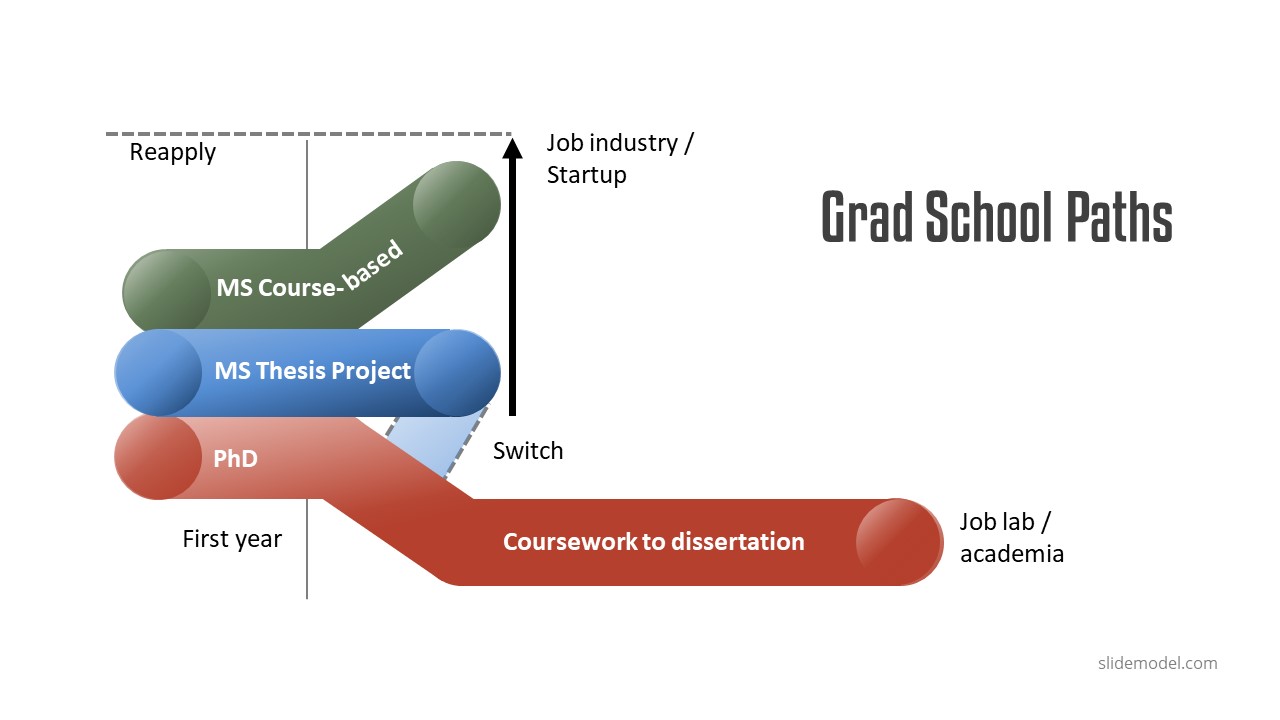
But above all, the most significant difference between the two papers is the purpose for which it is written.
A thesis, like what has been mentioned above, is being done by students obtaining a bachelor’s or master’s degree and has the purpose of testing their understanding of the discipline they’re engaged with.
A thesis is focused on obtaining technical expertise.
On the other hand, a dissertation is made for students to come up with an original study that other researchers haven’t already studied.
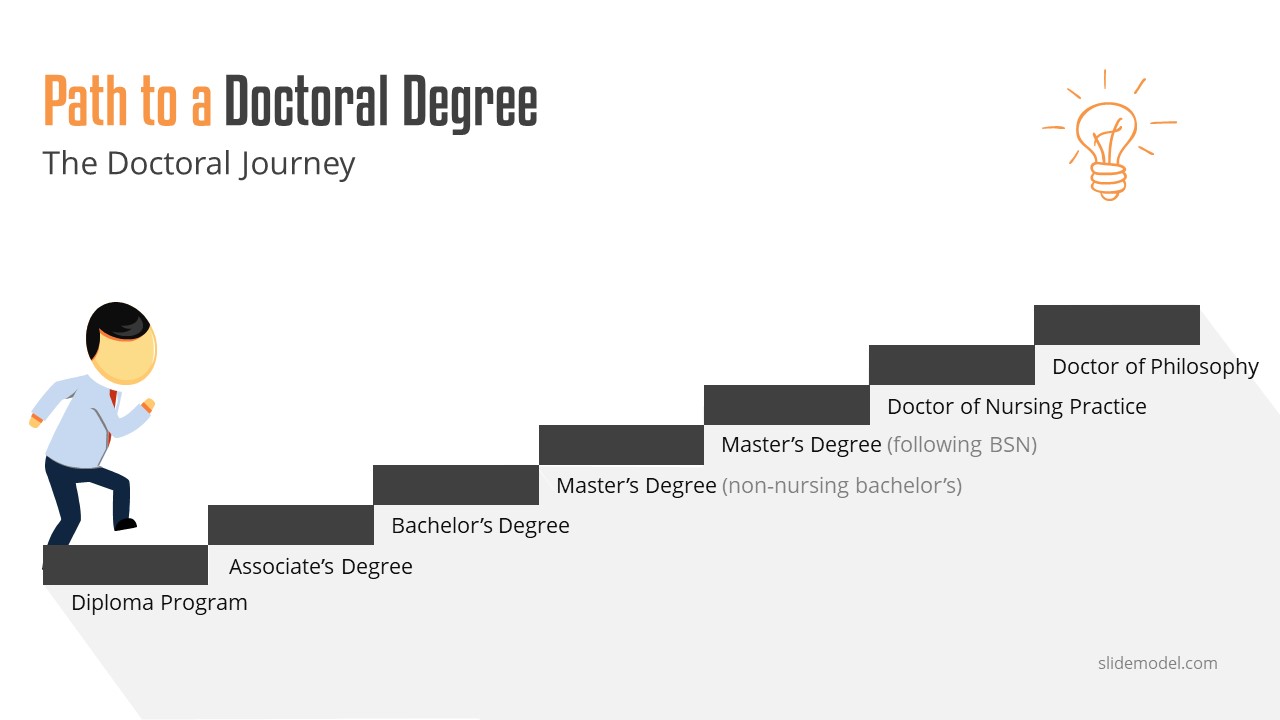
USA: In the United States of America, they consider a thesis shorter than a dissertation. In fact, aside from being a requirement to graduate in college, a thesis is now also inculcated in master’s degree programs. And since the dissertation is more extensive, the thesis is treated as preliminary in gaining a doctorate degree.
Europe: The distinction between the two papers is almost opposite to that of the USA. In Europe, a dissertation is only a broader research study from a post-graduate program and not the making of original research. Instead, educational systems in the said continent treat the doctoral thesis as a more elaborate paper writing.
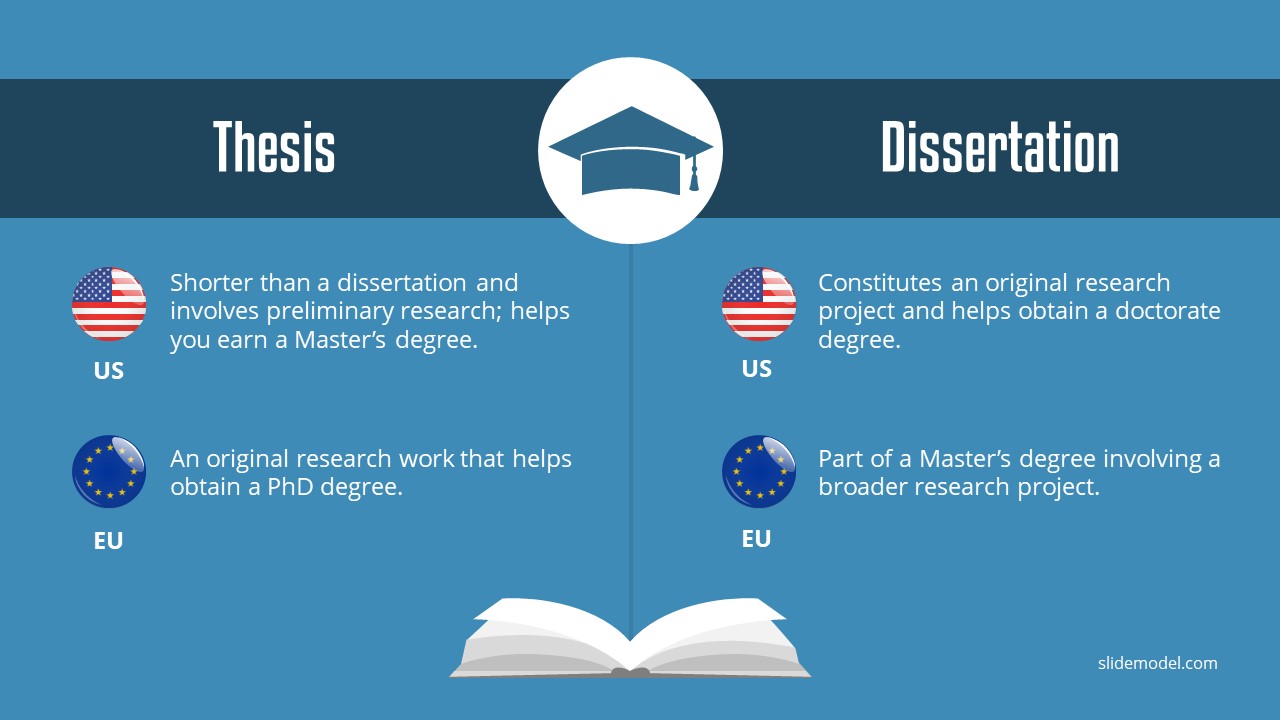
The difference between a thesis and a dissertation might not seem that big, but it’s important that we know what makes them different.
If your upcoming defense gives you pressure and uneasiness, it could be cause you are not sure what to expect. Today we will dispel three common thesis defense myths that will help you be more confident in your presentation.
“Answer all the questions correctly. Otherwise, your thesis won’t get approved.”
You are expected to have a focus on your research.
That being said, you have to study each part of your thesis, every detail, and even your sources.
You have to study and practice how to effectively deliver your presentation.
But don’t overthink to the extent that you’re stressing yourself to know everything perfectly.
Don’t overstress if you can’t answer one of the questions, this doesn’t necessarily mean the committee won’t approve your thesis.
You should know that research is a continuous study.
So you should expect that your committee will always be able to find a gap in your study to fill in future related research .
So in times you don’t exactly know the answer, admit it, and you’ll learn as they give their sides or suggestions.
Making up an answer will only displease your committee, so it’s to be upfront, honest, and transparent.
“The committee is just there to find holes in your study. They don’t care about you.”
One of the typical descriptions students have of the committee is that they are just there to poke holes in your thesis.
Going in with this perspective makes standing before them a nerve-wracking experience.
They’re not your enemy.
In fact, they are there to help you polish your study.
They might challenge you with difficult suggestions and tricky questions.
In the end, they will walk you through the process to come up with better results that won’t only benefit you but also your research.
They care about you and your study, and they’re ultimately there to make your thesis and the research better. Separate yourself from your work look at it objectively, and don’t take their comments personally .
“If your thesis defense isn’t successful, you have to start your thesis all over again”
An unsuccessful defense is one of the worst-case fears most students have.
One thing that you should be aware of is when you aren’t able to please your committee, you don’t need to start a new thesis again or go back to square one with your existing paper.
It’s unusual that your committee will ask you to change your topic and start from scratch again.
The fact that you’ve been permitted to defend your study means your research is almost complete.
They might suggest further details or ask you for minor revisions, and that’s normal.
But overall, you need to go into this defense thinking that your presentation will be successful. Otherwise, you are already setting yourself up for failure with the wrong mindset.
Remember that positive thoughts attract positive results.
Thesis Defense Presentation Structure and Slides Content
We can use language learning models like ChatGPT to help us curate the structure of our thesis presentation. Let’s see a step-by-step solution on how to apply this.
Step 1: Define the thesis topic and research questions
You can set the environment for ChatGPT to work by explaining what your thesis is going to cover and which specific questions you aim to address through the course of that document. This gives ChatGPT the context from which it shall formulate the structure. A prompt can be written like this:
“Take the role of an academic professional who shall help me to write my thesis. This thesis is going to cover the topic of (insert topic), and through its course, I want to answer these questions: Question 1 – Question 2 – Question 3 – Consider this information as the starting point for this chat.”
Step 2: Ask for an outline
With the previously provided information, ask ChatGPT to generate an outline for your presentation. If some of the points listed in the output don’t convince you, then chat with the interface until you reach a final outline. Then, ask to elaborate on each specific point for information or cues you may have overlooked.
Step 3: Ask ChatGPT which content should you place per slide
Instead of debating how are you going to trim your thesis into a presentation format, ask ChatGPT to do the decision process for you. You can be as specific as asking how many words per slide, how many slides should the presentation have, if you need any visual element, etc.
N.B.: We don’t recommend using ChatGPT to retrieve academic references as, in some cases, it can provide faulty results. You can ask if any facts on this presentation need to be checked or similar questions. ChatGPT is a powerful tool, but it shouldn’t be considered a bible, so be extra cautious about grabbing content directly from its outputs.
1. Title Page
This slide should contain the information that is provided on the title page of your hard copy . Here is an example of title page or cover slide for your title defense or thesis presentation.

- The title of your research paper
- Where you are studying
- Name and details of your course
- Name of Adviser
2. Introduction Slide
Your introduction slide should provide the committee with an idea of the following:
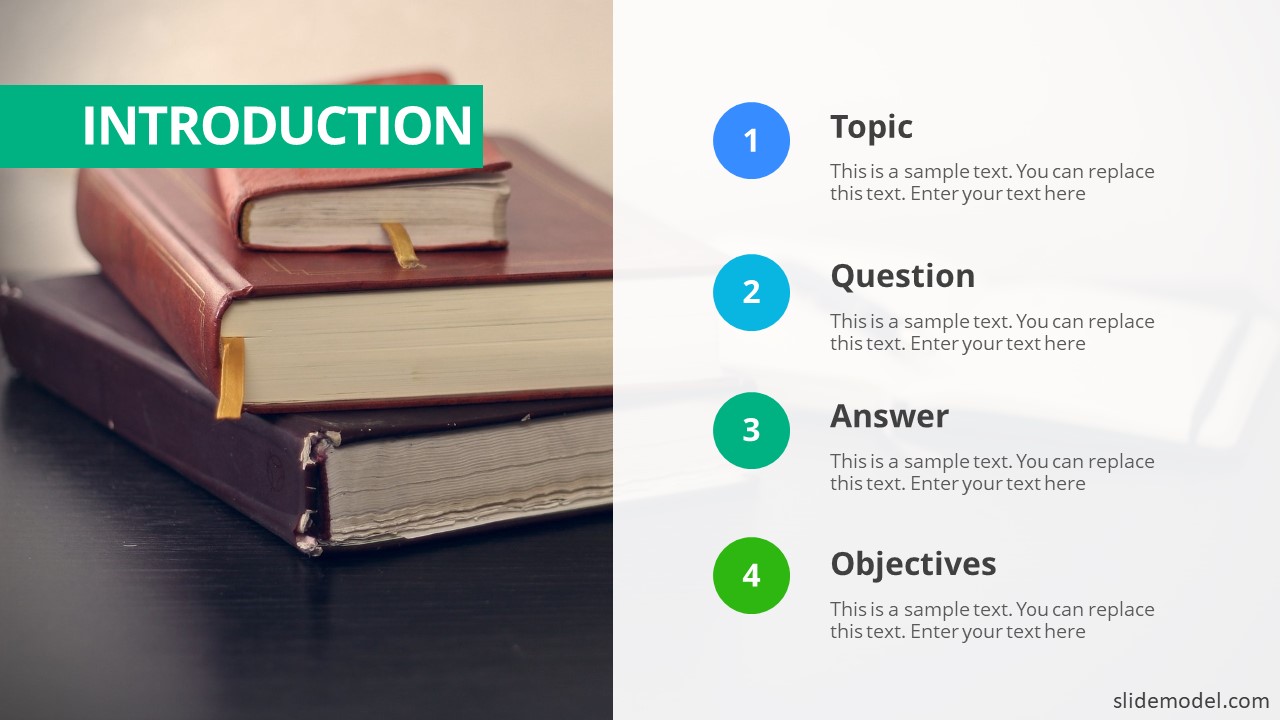
- What is the topic area that you are investigating ?
- What are the specific research questions that you set out to answer?
- Why is this question important to answer?
- What were the objectives of your research?
3. Literature Review Slide
It’s not necessary to cover everything that’s currently understood in the available literature. You may want to present the following content under a Literature Review slide:

- Relevant current research that is close to your topic
- Different theories that may apply to your specific area of research
- Areas of weakness that are currently highlighted
4. Methodology Slide
Make sure to touch the factors below within your process, and include the following in the Methodology slide:
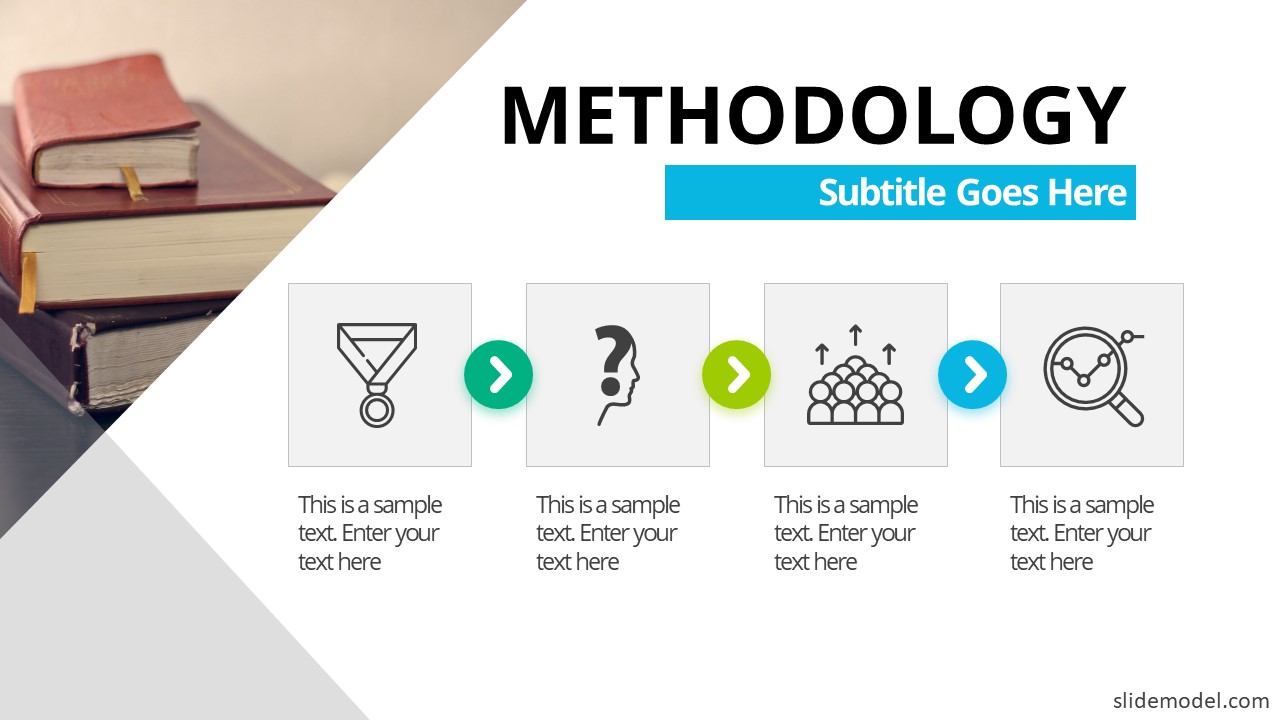
- The type of study you have conducted: qualitative, quantitative, or mixed
- The methods that you chose and why
- Details of the population, sampling methods, and other information
- Provide information regarding how you have analyzed the data that you have collected
5. Results Slide
This part should give the committee/audience a good understanding of what you’ve discovered during your research. The statistics & results slide could include the final results of your analysis, here is an example:

- An overall description of the data that you collected during your research
- The results of the analysis that you have done on that data
- What were the most significant findings from your data
6. Discussion Slide
Highlight here the meaning of the findings in relation to your discipline program and the research that you have done:

- What are the major findings, and what do they mean with regard to your research
- How do these findings relate to what others have found in the past
- How can you explain any unusual or surprising result
7. Conclusions Slide
You have to end your presentation with a conclusion summarizing all that you have found within your research. Here is an example of a Conclusion slide in a Thesis presentation:

- Restate your research questions
- Show how your results answer these questions
- Show what contribution you have made
- State any limitations to the work you have done
- Suggest future research
- Make any recommendations
See Also: How to Create a Great Investors Pitch Deck and Close the Deal
8. Acknowledgements Slide
Express gratitude to your advisor, committee members, peers, and others who supported your research journey. This slide provides a moment to acknowledge the collaborative nature of academic work.
9. Questions and Answers Slide
Dedicate a slide for audience questions at the end of your presentation.
Encourage engagement by inviting questions from the audience.
Be prepared to provide clear and concise responses to inquiries.
10. References Slide
Include a slide listing your cited sources throughout your presentation.
Use a consistent citation style (APA, MLA, Chicago, etc.).
The References slide demonstrates your thorough engagement with existing literature.
11. Contact Information Slide
If you’re open to further inquiries or collaborations, consider adding your contact information.
Include your email address or relevant professional social media handles.
How to use SlideModel AI Presentation Maker for your Thesis Presentation
If you want to save hours of manual time, you can leverage AI tools to make your thesis presentation. The best part of integrating AI tools into our workflow is that we can pair them to get even better results than we expected. With SlideModel’s AI presentation maker , users can create an entire slide deck by introducing these variables:
- Topic of your thesis
- Number of slides to include in your thesis presentation
- Outline checkup
And that’s it! Download the AI-generated presentation in PPTX format or for Google Slides, and edit it if you require adding some extra content. The core elements are already done, and you can save countless hours of hard work.
Tips During Your Oral Defense!
Review your materials.
Even if you already feel confident with your upcoming presentation, you still need to review your materials.
You can bring the hard copy of your thesis with you during the defense, but you don’t want to get lost in your presentation when you forget some specific details and have to scan your papers.
You should know your paper in and out.
Rehearse Your Presentation
It’s not wrong if it sounds like a script when you speak in your oral defense. It’s expected and understandable.
You need to practice your presentation, especially when there’s a time restriction given to every presenter.
You only need to prepare enough slides that would fit your time limit. A hundred slides aren’t suitable for a 15 to 20-minute presentation, nor 10 slides for an hour of defense.
Your rehearsal will be more effective if you practice it in front of an audience.
Note: You will experience complete silence in the defense room. You might feel awkward because, most of the time, you’re the only one speaking out loud. This is completely fine, and it’s something you should practice in rehearsal should you be afraid.
Narrow the Presentation of Ideas
Regarding your slides, you don’t have to include everything that’s in your paper. You should narrow down your ideas to the main points and the most important details, such as the statistics and findings.
If the members of your committee think you lack details or they want to hear a further explanation, they won’t hesitate to ask you.
Prepare for the Unexpected Questions
The panel tends to challenge the presenters, usually through some hard questions.
Its aim is how well do you you have done your research and how prepared you are.
But as long as you know the ins and outs of your paper, you shouldn’t lose your confidence regardless of which questions they ask.
Just keep in mind that what you’re saying in your oral defense is not in conflict with what is written on the hard copy you provided them.
What To Do When You Don’t Know the Answer
If the committee asks you a question and you don’t know the answer, don’t make up a baseless answer.
Baseless means out-of-context answers or something without proof or backup.
How To Deal With The Nervousness
The committee expects you to be nervous. Of course, it’s normal.
However, one effect of being nervous is the changes in your behavior.
There’s a tendency for you’ll talk fast, which will make it hard for the committee to understand you.
It might also cause you to have a mental block.
So try to slow down. Take a deep breath.
Inhale, exhale. Remember to breathe!
It’s OK to pause, and it’s OK to take your time; it’s more important that the committee clearly understands what you are trying to articulate.
More Quick Tips on How to Present!
- Introduce yourself at the beginning
- Introduce the title of the presentation
- Don’t read your notes if possible
- Don’t speak too fast
- Put an emphasis on what you’re saying so you don’t sound monotonous
- Look at your adviser once in a while for possible signs
- Stand on the right of the white screen if you are right-handed so you can easily refer to the slide without giving your back to the committee
- Face the audience when you talk
- Keep an eye contact
- Make sure to keep attention to the reactions of the committee and don’t forget to react in turn
We hope you enjoyed this article on how to do a proper thesis defense and how to best prepare for one using proven tips and techniques to help you get through this. Hopefully, after your defense, you will be set as the one in your class to deliver an inspiring graduation speech for your peers. If you have value, please remember to share this article. We also recommend you read these Thesis Statement Examples for inspiration to create your own professionally.
1. MasterDoc PowerPoint Template

Creating a Thesis presentation should be a straight forward task; based on your thesis document and following the tips described above you have a high level structure already outlined. The MasterDoc PowerPoint template provides professional layouts with texts and image placeholders; so you can create document like slides using your thesis defense as your content. This template is ideal for a highly detailed documents, where visuals and words unite to illustrate one concept per page. The result is an asset that can be read and digested more quickly than either your thesis document or a presentation created for assisting a speech. A document created with the MasterDoc PowerPoint templates is meant to be printed or distributed, read on screen without the accompaniment of a presenter or used in an e-learning platform as pure learning content.
Use This Template
2. Thesis Presentation PowerPoint Template

You had invested a considerable time researching, testing hypothesis and confirming your thesis. Craft your thesis presentation with the same level of detail you applied in your work. Using the Thesis Presentation PowerPoint Template you will focus only in your content and your message. The layouts, images,design and structure will be taken care by the template.
3. Master Thesis PowerPoint Template

The Master Thesis PowerPoint Template is a professional document designed for postgraduate degrees presentations. It provides simple sections that follow the structure and best practices of traditional research thesis presentations. Starting with the introduction to the theory and state of the art scenario; following with hypothesis research and its findings and concluding with the confirmation or negation of the initial thesis statement.
4. Essay Outline PowerPoint Template

Your thesis defense can be accompanied by an essay, that states your thesis and argues about it using several supporting paragraphs. This kind of document is ideal to be an intermediate step between reading assisting to the thesis presentation and reading the complete thesis documentation. It has more information that your thesis defense abstract, but does summarizes the supporting evidence and examples that allows the argument of each idea behind the thesis. You can use the Essay Outline Template to present your Essay outline and create an essay linked to your thesis defense documentation.
Like this article? Please share
Academics, Degree, Dissertation, Doctorate, Education, Faculty, Master, PhD, Student, Thesis Filed under Presentation Ideas
Related Articles
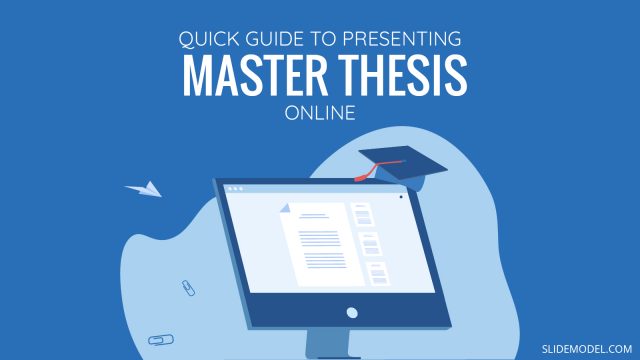
Filed under Education • June 19th, 2024

A Quick Guide to Presenting an Online Master’s Thesis
A Master thesis is one of the most important career times, and can be the make it or break it of years of study. Learn more in this article on how to make it amazing.
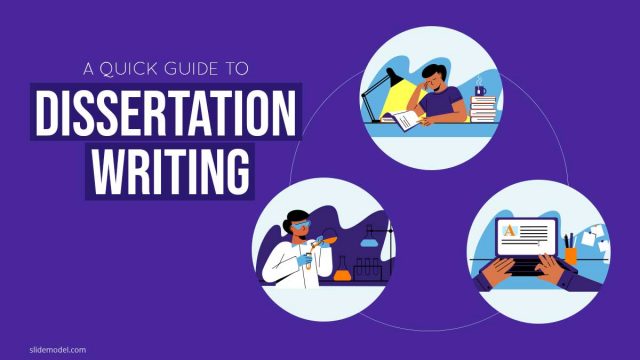
Filed under Education • June 4th, 2024
A Quick Guide to Dissertation Writing
This articles provides a summarized guide answering the main questions professionals have when writing their dissertation. You will learn the basic structure and its content. You can download assets for your dissertation presentation.

Filed under PowerPoint Tutorials • May 22nd, 2024
How to Cite a PowerPoint in APA
Learn how to correctly apply the APA style in your presentations by learning how to cite slides, books and images in APA in PowerPoint.
36 Responses to “How To Do a Proper Thesis Defense Using the Right PowerPoint Presentation”
Great job! This has made my thesis presentation a whole lot easier.
Excellent !!!!!
Now I feel I’m quite confident on how to do my dissertation presentation properly and how to defend it. I will share that with other friends and colleagues.
Thank you so much for your kind help.
Best regards, Awad
Thank you for such a valuable guide.
it was very helpful
Thanks a bunch for the general summary for thesis defense with all related information that we might have to know. Great job!
Great tips.
i have proposal defense in two days and im so nervous right now! reading this is helpful in some ways thankyou!
It’s very helpful and understandable. Easy steps to follow.
I found it very helpful to refresh and make my self ready for my defense!
Thank you a lot this article. It’s really helpful!
Naveen Kumar S: Thank you its very Helpful. I appreciate all your effort this is very useful.
Very important and interesting so go on thank you
I really like it. In the near future I am going to present for the MA thesis. Therefore, it will guide me a lot. If you can please attach with this email the detail.
I do like the article as it proves to be valuable and worthy. I enjoyed reading every single note. It helped me feel at ease and have confidence when my viva day takes place. THANK YOU SO MUCH.
Appreciate your Assistance
Thanks a lot for the gist
Thank you so much, I got full information and knowledge.
This has made me look forward to my thesis defense. Thanks a lot
Very useful
thank you very much for your best information
Thank you very much the article is full of knowledge on Thesis as well as dissertation defense. Big Up!
I am appreciative. Well informative and educative.
Thanks immensely for these wonderful tips on presentation during defense. I personally found more useful to me as I prepare to defend my Master Dissertation.
Thank you very much! I now feel more confident.
Thanks for your good self overall usability of the Participations motivated points and contribute significantly in thesis defense practices. Best wishes to one and All
Happy To Help.
Thank you very much. As I am pursuing for my PhD in Leadership, I got it so meaningful and worth having.
Your tips on What a Thesis and Dissertation are, are on point. I have fully understood their differences and similarities. I have also noted the killer way of summaring a Power Point Presentation. Slidemodel.com…you are just a force to reckon with. I need more information…in case you have models you can share with me and those interested in this subject covered.
Thanks a million times for your timely guidance. Just preparing to do my PhD Thesis defense.
this was very, very helpful…Thank you!
Highly appreciate your effort to deliver what a student is looking for. I find your article really helpful and to the point. Thanks !
Regarding to my P.P, I’ve understood so many issues from this. Thankyou!
i got it as it is so important for my deffence presentation, thanky you very much
This Material was very hopeful and encourage any student who prepare any presentation relation with thesis. It also combined more encauragable and it enhance presentation!
Thought provoking content Thank you.
Great comments. very helpful
Leave a Reply
Campus MyThesis Academy
The unique, worldwide Campus where you´ll learn how to write a thesis advised by an expert who graduated summa cum laude

Mastering Your Thesis Defense: An In-depth Guide

We applaud your persistence and dedication in reaching the final step of your journey: the thesis defense . This is the crucial stage where you are called to succinctly articulate the results of your hard work. To prepare you for this task, we will provide a comprehensive guide on effectively preparing for your thesis defense .
The Pinnacle of Your Journey: Preparing for Your Thesis Defense
Thesis submission: a significant milestone.
Months, perhaps even years of attending lectures, conducting research, participating in fieldwork, analyzing data, and critically assessing your findings have led you to this point: the day of

your thesis defense . Not to mention the rigorous process of editing and proofreading your dissertation . The day of submitting your Ph.D. thesis is undoubtedly a red-letter day in your academic journey. You probably celebrated this momentous thesis submission with your near and dear ones, taking a breather after an extended period of focused work.
The Next Step: Preparing for the Thesis Defense
However, after some time, you start to realize that there’s one final hurdle: the thesis defense! This includes preparing your thesis defense presentation and gearing up for the oral examination, often referred to as the disputation. So, what should you bear in mind while preparing for your master’s thesis defense or your Ph.D. thesis defense?
Practical Tips for Your Disputation Preparation

- Generate a draft version of your presentation.
- Consider the most suitable format and software for your thesis defense presentation , such as PowerPoint, Keynote, and others.
- Compile a list of the most crucial sources and references .
- Incorporate pivotal graphics, photographs, and videos in your presentation.
- Draft and brainstorm for your thesis defense while the information is still fresh in your mind.
- Ensure that you don’t put your dissertation out of sight after submitting it, as you’ll need to recall it in detail during your thesis defense presentation!
Excel in Your Thesis Defense with Campus MyThesis Academy At MyThesis Academy , we understand the challenges that come with preparing for a thesis defense. That’s why we’ve committed ourselves to providing the best e-learning resources to guide you through this process. Our online campus offers a comprehensive range of learning materials designed to help you excel in your thesis defense. Whether you’re working on your bachelor’s, master’s, or Ph.D. thesis defense presentation, we have tailored resources that will make a significant difference. We provide insights into how to create an excellent presentation and stand out from the crowd. Here’s what we offer on our e-learning platform: Guidelines on how to adhere to your presentation’s time frame effectively. Tips on developing a professional presentation using various software such as PowerPoint, Keynote, etc. Advice on slide preparation and design style to maintain a coherent and engaging presentation. Tips on how to focus on the most crucial information and avoid overloading your slides with excessive text. Guidance on practicing your presentation effectively with family and friends. We are serious about making academic progress accessible and straightforward. We are committed to your success and we want to ensure that you feel supported throughout your journey. At MyThesis Academy , we’re interested in your success, and we’ve got the tools to help you achieve it!
Understanding the Concept of a Thesis Defense
The thesis defense is the concluding oral examination that officially rounds off the process of submitting your thesis.
Option 1: Defending Your Academic Work (Disputation)
As the term suggests, you must defend your academic work before an audience composed of a committee and a select group of guests. The committee typically includes your primary and secondary supervisor and the chair of your Ph.D. examination board. The decision and format of allowing external guests may vary from one university to another.

This involves an opening segment where you present the core aspects of your work, followed by a Q&A segment where the audience can pose questions and comments.
Option 2: Undertaking a “Rigorosum”
Some universities may adhere to the traditional form of a “ Rigorosum ” for their Ph.D. candidates. In this scenario, you must prepare two brief presentations of approximately 15 minutes each on topics from the same discipline but different fields, followed by a question-and-answer segment led by the committee.
The Thesis Defense Process: Three Key Phases
The thesis defense or disputation typically consists of two key official parts and a concluding phase.
Phase One: Opening and Presentation
In the initial phase, you are expected to present:
- The central questions of your dissertation
- The primary focus or research aims
- Basic concepts (briefly)
- Significant sources and data material
- Methodologies of analysis
- The outcomes of your research
Considering the time constraint, all these elements must be presented succinctly.
Phase Two: Discussion and Questioning – Disputation
In the second phase, the examination board and the audience pose broad and detailed questions, leading to a discussion. The chair of the examination board moderates the order of questions.

The order of questioning typically includes:
- First and second supervisor
- Members of the board
- Other (internal) academics and colleagues
- Audience (external academics and non-academic guests)
Phase Three: Conclusion and Evaluation
To wrap up, the chair concludes the discussion when all questions have been posed or when the allotted time is up. The audience is then asked to step out, and the examination board gathers
for a brief private final evaluation. Following this, the final result is announced.

Clarifying a Common Confusion: Defense or Defence?
Is there a difference between defense and defence ? The answer is, no. The variation in spelling— thesis defense or thesis defence —is simply a matter of geographical convention. While
American English prefers the spelling ‘defense’, British and Canadian English use ‘defence’. Regardless of the spelling, the process and proceedings of a defence or defense remain the same!
Determining the Duration of a Thesis Defense⌛
The exact format and duration of a thesis defense can differ from one university to another. Generally, the initial presentation lasts around 20 to 30 minutes, followed by a questioning segment ranging from 30 to 60 minutes .
How to Excel in Your Thesis Defense: Key Points and Secrets✨
Whether you’re crafting your bachelor’s thesis presentation, your master’s thesis defense presentation, or preparing for your Ph.D. disputation, there are certain crucial points that differentiate an excellent presentation from a mediocre one. Here’s a checklist with some critical elements that can help make your presentation clear and coherent for the audience:
- Stay within the time limit: double-check if your presentation fits within the given time frame.
- Develop a professional presentation using PowerPoint, Keynote, etc.
- Avoid using just a handwritten draft paper and not checking your presentation’s timing.
- Refrain from preparing too many slides.
- Do not overload the slides with excessive text.
- Focus only on the most crucial information.
- Choose a coherent design style for the presentation.
- Ensure that you have an opening slide, including the date, title, supervisors’ names, and details about your University/Faculty, etc.
- Practice the presentation with family and friends.
Then, it’s time to celebrate! Congratulations!
For more specific design ideas, presentation examples, and a collection of tips and advice on crafting your presentation, visit our thesis defense presentation templates section!
Do not use complex words or phrases. Make it easy to understand. Let the reader feel, that he is in good hands and that we are serious about it! Make him feel, that we are interested in him and his success!
About the author:

Possibly you already heard of me through different media channels. My name is Dr. Friederike Jurth, and I hold a certificate from Harvard in Higher Education Teaching . Since 2010, I have given lectures on Methodology, Empirical Research, Anthropology, and Transcultural (Music) Studies in collaboration with universities in the United States, Germany, Spain, and Brazil . In 2010, I began a 7-year-long fieldwork project in Rio de Janeiro and have since presented my research at conferences worldwide, including in Japan, the United States, Australia, Brazil, Thailand, Switzerland, and many other countries. Additionally, I have worked as a lecturer and researcher with Germany’s renowned UNESCO Chair .
After completing my doctoral dissertation with summa cum laude , I aimed to unite, condense, and share the steps, ways, and details of my unique methodological and structural approach that I developed during my Ph.D. and that ultimately helped me achieve this result. By concentrating and putting them together into an elaborate academic conception, MyThesis Academy was born. Motivated by the sole aim and objective to help my students through all steps and stages of their thesis journey, MyThesis Academy enables them to achieve their best possible results in the shortest time, independent of their specific area of research.
In addition to my extensive teaching and research experience, I am part of the authors of the Cambridge Companion to Music in Brazil 2024, published by Cambridge University Press & Assessment , where I contribute as a Cambridge Author. This work is a co-operative project conducted remotely from Cambridge, England, United Kingdom.
United States & International Students
- SSL Protection
© Copyright 2024 - MyThesis Academy®. All rights reserved.

Masterclass Free

- Deutsch ( German )
- Español ( Spanish )
- Slidesgo School
- Presentation Tips
How to Start a Thesis Defense Presentation

After months and years of hard work, the moment to wrap things all up is finally here—your thesis defense presentation.
Whether you’re pursuing a master’s degree or doctorate, it’s the final step to that much-deserved achievement.
A thesis defense requires a lot of prior research and preparation. And as important as its content is, so is how you present it because a stunning design with clear data and text hierarchy plays an immense role in comprehension.
In this article, we’ll explore how you make your thesis defense .
The organization is the key to success. Establishing some previous steps before any project or work is essential for the result to be very positive. And the defense of a thesis could not be less.
Below, we will develop all the necessary steps to make a thesis defense presentation and we will give you some tips on how to carry them out.
How to Make an Amazing Presentation
Defining the concept of your thesis presentation, structuring your thesis defense presentation, how do you welcome the audience, tell them why you did this thesis, go into the content by explaining your thesis part by part, how to end the defense of the thesis.
After a long time of research and study, the content of your thesis is ready. Now, you have to find the best way to reflect all that effort behind your work. The information comes across more clearly if you use a visual format, as it attracts the attention of the audience. To present your thesis information in a clear, concise, and ultimately amazing way, you can use one of our unique thesis defense templates , available at Slidesgo.
As an example, in this article, we are going to use the Ecology Thesis template . With it, we will show you what to include in your presentation and how to make an attractive design.
After choosing the Google Slides and PowerPoint template that best suits the needs and subject matter of your thesis, it is time to define an overarching concept.
This is the main theme on which your designs are based. It must be relevant to your thesis as its purpose is to guide your selection of colors, typography, images, style, etc.
These must be portrayed in a way that supports the main message of your slides and should be aligned with your concept both visually and sociologically.
Once you have defined the concept, you will have to move on to the next step: structuring the content of your thesis. A good structure will show that there is a good organization behind the work, but most importantly: it will highlight your content.
In this article, we are going to show you a structure that could be a good example of how to structure a thesis, but you can adapt it to what your specific content requires.
Before you begin your thesis defense, you should welcome your audience. A good presentation will make you connect with your audience, which will result in more general interest in your work.
Use an appropriate language register (avoid informal language), but be approachable and natural.
"Welcome to the thesis defense on [the title of your thesis]". Next, introduce yourself with your name and give a short description of your background and occupation.
Don't forget to say “thank you for attending!”
To continue establishing that connection with your audience, explain the reasons that led you to do this thesis. Tell the professional reasons, and you can even say some personal ones, which will denote closeness, and your audience will appreciate it.
Now it's time to go into the content of the thesis ! After these preliminary steps, which are just as important as the thesis itself, it is time to explain part by part the structure (which you had previously established). We are going to propose a structure for your project, but the final decision is always yours!

First impressions are very important. Because your title page is the very first thing viewers see, it must be striking and impactful. It also sets the stage for the rest of your slides.
In one glance, the following should be established:
- Thesis defense topic
- Design style
For instance, the ecology thesis’s title page uses illustrations of a natural landscape to represent the topic of nature and a striking shade of blue to set the tone.
The sans serif font used depicts clean-cut typography and style and the thesis topic is written in large and bold typography, which draws attention to it immediately.
.jpg)
Right after your title page, include an introduction slide to provide more details about your topic.
This means explaining what you hope to answer with your research, its importance to your field, and why you chose it.
Continue to incorporate design elements relevant to your concept. This example has done just that by using a different natural landscape and including animals. For coherence, stick to the same typography and style throughout your presentation.
.jpg)
The aim of the literature review slide is to illustrate your knowledge of your thesis topic and any relevant theories.
Walls of text kill a design. For clarity, we recommend presenting this with bullet points. Each one should be short and sweet and only touch on the basics; you can elaborate on them in your speech.
Don’t forget to be consistent with your design. In our example, we’ve maintained the tone of blue chosen and added illustrations of leaves in the far corners of the slide.
Also, address similar research that has been done. This is to showcase your topic’s originality and, if relevant, how it’s different and/or an improvement from previously done research.
.jpg)
This is one of the most important parts of a thesis defense presentation.
It allows your viewers to assess the rationality and validity of your approach and consequently, the accuracy of your results.
A great methodology slide explains the what , how, and why :
- What method did you use for your research
- Why did you choose it
- How did you conduct it
Because this part of your thesis will be rather technical, the most effective way to aid understanding is by using graphics like charts and tables.
.jpg)
Keep text to a minimum to avoid drawing attention away from the graphics. If there is a text that must absolutely be included, consider using bullet points and keep them short.
Don’t forget to maintain color, style, and typography coherence.
.jpg)
The results slides are easily the most quantitative part of a thesis defense.
Here, your aim is to simply introduce your findings. Select the most impactful data and highlight them here.
Just as with methodology, use graphics like charts, tables, and graphs to portray the data in a clear way. And, once again, try not to write too much text. Let the visual content do the talking .
.jpg)
After you’ve introduced your data, the next step would be to help your audience make sense of it. That means understanding what it means in the context of your thesis research topic and your discipline.
Simply put, you should answer the question: What do the numbers mean?
The best way to approach this would be to do it as if you were creating an infographic .
Illustrations like icons are a quick and simple way to represent your message. It also reduces the amount of text on your slide, which makes the information much more digestible.
For a balanced thesis presentation, you should also address any outliers and anomalies.
To quote bestselling author Robin Sharma, “Starting strong is good. Finishing strong is epic.”
That’s exactly what to aim for in your conclusion.
Provide an overview of your thesis topic and remind your audience what you set out to answer with your research. In our example, we’ve used three icons accompanied by a short title and text.
.jpg)
Following that, reiterate the important points of your research results you want your audience to take away from your thesis defense presentation.
You can do so by expanding the next slide to have more icons and points, for example.
.jpg)
Don’t forget to address any shortcomings and limitations in your approach and extra points for suggesting possible improvements for future research.
We are going to give you a little tip to make your thesis defense a success. You can combine your defense with good public speaking techniques. Take a look at our article "How to become a great speaker" .
We hope this article has been of great help, have you already seen our templates to make the presentation of your thesis ? Choose the one that best suits your needs, we are sure that one of them will go perfectly with your thesis presentation!
Good luck from Slidesgo.

Do you find this article useful?
Related tutorials.

Top 8 About me presentation templates for going back to school
With the new school year just around the corner, we are all gearing up for those first few days of class. As teachers, one of the most enjoyable ways to break the ice and create a welcoming atmosphere is through an engaging about me presentation. It’s a great way to introduce yourself to your students or help them share their own stories. A well-crafted template can make this process meaningful… and fun, too!In this post, you will find the top 8 about me presentation templates for free that are simply perfect for the back-to-school season. These templates are available to help...

Make school fun from day one with Disney and Pixar templates
The shine of new books, the smell of fresh notes, the clink of the pens in your pencil case, the sound of the bell, and the feel of desks… Back-to-school is here, tingling all your senses! But even if this isn’t your first rodeo in the educational arena, there’s an extra flutter in your stomach this time around. Can you feel it? Because back to school is back to fun, and our +100 templates featuring Disney and Pixar characters are just what you need to make it a blast.This school year, get ready to renew and empower your teaching with Slidesgo’s Disney and...

Free printable coloring pages in PDF for back to school
As the new school term approaches, excitement, and anticipation fill the air. One fantastic way to channel this energy is through free back to school coloring pages! These aren’t just for fun—printable coloring pages in PDF format can help kids develop fine motor skills, enhance their creativity, and provide a calming activity amidst the bustle of back-to-school preparations. These engaging materials offer a wonderful opportunity for children to express themselves and ease into kindergarten or preschool with joy and confidence. Whether it's during a break from homework or a rainy day activity, printable coloring pages are a perfect blend of entertainment and education.

SmartStart educational webinar: Smart moves for smarter teaching
Feeling those post-holiday blues sneaking up is a common tale. According to experts, nearly a third of us mourn the end of summer’s leisure. But you’re not on that page—you’re part of the enthusiastic majority, eager to make this academic year the most exciting one yet thanks to some fresh, energized tools at your disposal from Slidesgo.If you’re on the hunt for groundbreaking ideas to get the best out of our resources, SmartStart is the jolt of energy you need. This vibrant online event is where passion for education meets cutting-edge technology. Packed with insightful talks and real-world solutions from seasoned educators, SmartStart is all about empowering...
- How It Works
- PhD thesis writing
- Master thesis writing
- Bachelor thesis writing
- Dissertation writing service
- Dissertation abstract writing
- Thesis proposal writing
- Thesis editing service
- Thesis proofreading service
- Thesis formatting service
- Coursework writing service
- Research paper writing service
- Architecture thesis writing
- Computer science thesis writing
- Engineering thesis writing
- History thesis writing
- MBA thesis writing
- Nursing dissertation writing
- Psychology dissertation writing
- Sociology thesis writing
- Statistics dissertation writing
- Buy dissertation online
- Write my dissertation
- Cheap thesis
- Cheap dissertation
- Custom dissertation
- Dissertation help
- Pay for thesis
- Pay for dissertation
- Senior thesis
- Write my thesis
Dissertation Defense: Steps To Follow To Succeed

A dissertation defense is arguably one of the most important milestones in every student’s career. While it signals that your tenure as a student is soon about to close, it validates all your efforts towards your thesis.
Being cautious about including all the necessary details is very important to successfully complete your dissertation proposal defense. This article tells you everything that you need to know about writing a defense that can add great credibility to you as a student.
What is A Dissertation Defense?
The first thing that you need to learn is what is a dissertation defense and what is its purpose. In simple terms, it is a presentation made by a student to defend all the ideas and views that are presented in a dissertation.
The presenter must include details like what is the reason for choosing specific research methods, the theory that has been selected for the paper, and other such points. This presentation is made before an audience that comprises of the university committee, professors and even fellow-students. It is met with questions and answers that gives the student an opportunity to provide more clarity on the dissertation in order to convince the committee to approve it.
Stages of a Dissertation Defense
One of the most important dissertation defense tips provided by several professors is to breakdown the process into three steps:
- Preparation : This stage involves collection of all the necessary information that must be included in the defense dissertation and making all the arrangements for the actual meeting.
- The defense meeting : This is where you decide how you will present the defense. The actual meeting is hugely reliant on the performance, body language and the confidence in your oral defense.
- After the defense meeting : This stage, also known as the follow up, requires you to make the necessary revisions suggested by the university committee. You can even provide bound copies of the whole dissertation to distribute among different members of your departments. In the follow up stage, one must also think about expense that are related to publishing the Ph.D. dissertation defense as well as printing additional copies of the manuscript, if required.
How Long is a Dissertation Defense?
The first thing that a student should know is how long does a dissertation defense last? The length has to be carefully calculated to make the impact that you want. One of the most important steps in the dissertation preparation is to understand how much time each department allocates to the closing oral defense. When you plan in the early stages of your dissertation itself, you can write it in a manner that allows you to defend it in the allocated time.
Usually these meetings including the presentation, the oral defense and the question and answer session last for about two hours. In most cases, these two hours also encompass the time needed by members of the committee to deliberate.
How to Prepare for the Dissertation Defense
Now that you know how long is a dissertation defense, the next step is to prepare well enough to make your presentation impressive.
Here are some tips on how to prepare for a dissertation defense:
- Watch other students in action to learn about different presentation styles. You can attend defenses of different colleagues in your department as well as other departments in your university.
- Get all the details about the deadlines and the rules of your college or university about scheduling your defense.
- Scheduling is also a very important part of your preparation. It is important to note that members of the committee and University chairs need to make time for these defences in a very packed schedule. Coordinate the date, venue and time of your defense as early as possible.
- Prepare a manuscript adhering to the necessary formatting rules. Review your manuscript thoroughly before you hand it in. During your PH.D, your faculty will also assist you with the defense. For this, they must have a crisp and polished copy of your manuscript.
- Most colleges have the facility for a pre-defense meeting. This is the best opportunity to sort out any concerns that you may have about the actual meeting. It is a good idea to ask the chairs what types of questions may be put forward and if there are any problems with the defense that need to be resolved. When you prepare for a pre-defense meeting, think of it as the final one and give it your all.
- Put together all the material that you need for the defense. A detailed, yet to-the-point presentation must be prepared.
- The final stage of preparation is practicing your presentation over and over again. It is not just the presentation but also the approach towards the questions that you must practice.
Tips To Nail Your Actual Meeting
With these tips you will be one step closer towards a successful defense that will help your dissertation pass and be approved:
- All meetings should begin by addressing the chair. Make sure you thank all the committee members and the advisors for the efforts that they have put it. This gives you a professional start to the presentation.
- The presentation should cover the following subjects in brief:
- The research topic
- Literature review
- The methods used for analysis
- The primary findings of the research
- Recommendations of additional research on the subject in the focus.
- Do not get rattled by any discussions among the chairs. They will deliberate on any disagreements or topics of interest. This is a part of the process and is not a reflection of the presentation itself.
- There are two questions that are commonly asked that you should be prepared for. This includes the weaknesses of the dissertation and the research plans that you have made post-dissertation.
- Use subtle gestures when you are talking. Do not overuse your hands when doing so. The whole meeting including the question and answer session should have a very formal appeal.
- The tone of your voice must be assertive without making it seem like you are trying to hard. Be clear and enunciate when you speak.
Once the questions have been answered, the committee will leave the room. Then, after the deliberation, you will be informed if your dissertation has passed or not.
For affordable thesis writing assistance , get in touch our team today. The pricing is cheap but students can be assured of top notch quality in all our final products.

Leave a Reply Cancel reply
Your email address will not be published. Required fields are marked *
Comment * Error message
Name * Error message
Email * Error message
Save my name, email, and website in this browser for the next time I comment.
As Putin continues killing civilians, bombing kindergartens, and threatening WWIII, Ukraine fights for the world's peaceful future.
Ukraine Live Updates
Reference management. Clean and simple.
How to write an excellent thesis conclusion [with examples]

Restate the thesis
Review or reiterate key points of your work, explain why your work is relevant, a take-away for the reader, more resources on writing thesis conclusions, frequently asked questions about writing an excellent thesis conclusion, related articles.
At this point in your writing, you have most likely finished your introduction and the body of your thesis, dissertation, or research paper . While this is a reason to celebrate, you should not underestimate the importance of your conclusion. The conclusion is the last thing that your reader will see, so it should be memorable.
A good conclusion will review the key points of the thesis and explain to the reader why the information is relevant, applicable, or related to the world as a whole. Make sure to dedicate enough of your writing time to the conclusion and do not put it off until the very last minute.
This article provides an effective technique for writing a conclusion adapted from Erika Eby’s The College Student's Guide to Writing a Good Research Paper: 101 Easy Tips & Tricks to Make Your Work Stand Out .
While the thesis introduction starts out with broad statements about the topic, and then narrows it down to the thesis statement , a thesis conclusion does the same in the opposite order.
- Restate the thesis.
- Review or reiterate key points of your work.
- Explain why your work is relevant.
- Include a core take-away message for the reader.
Tip: Don’t just copy and paste your thesis into your conclusion. Restate it in different words.
The best way to start a conclusion is simply by restating the thesis statement. That does not mean just copying and pasting it from the introduction, but putting it into different words.
You will need to change the structure and wording of it to avoid sounding repetitive. Also, be firm in your conclusion just as you were in the introduction. Try to avoid sounding apologetic by using phrases like "This paper has tried to show..."
The conclusion should address all the same parts as the thesis while making it clear that the reader has reached the end. You are telling the reader that your research is finished and what your findings are.
I have argued throughout this work that the point of critical mass for biopolitical immunity occurred during the Romantic period because of that era's unique combination of post-revolutionary politics and innovations in smallpox prevention. In particular, I demonstrated that the French Revolution and the discovery of vaccination in the 1790s triggered a reconsideration of the relationship between bodies and the state.
Tip: Try to reiterate points from your introduction in your thesis conclusion.
The next step is to review the main points of the thesis as a whole. Look back at the body of of your project and make a note of the key ideas. You can reword these ideas the same way you reworded your thesis statement and then incorporate that into the conclusion.
You can also repeat striking quotations or statistics, but do not use more than two. As the conclusion represents your own closing thoughts on the topic , it should mainly consist of your own words.
In addition, conclusions can contain recommendations to the reader or relevant questions that further the thesis. You should ask yourself:
- What you would ideally like to see your readers do in reaction to your paper?
- Do you want them to take a certain action or investigate further?
- Is there a bigger issue that your paper wants to draw attention to?
Also, try to reference your introduction in your conclusion. You have already taken a first step by restating your thesis. Now, check whether there are other key words, phrases or ideas that are mentioned in your introduction that fit into your conclusion. Connecting the introduction to the conclusion in this way will help readers feel satisfied.
I explored how Mary Wollstonecraft, in both her fiction and political writings, envisions an ideal medico-political state, and how other writers like William Wordsworth and Mary Shelley increasingly imagined the body politic literally, as an incorporated political collective made up of bodies whose immunity to political and medical ills was essential to a healthy state.
Tip: Make sure to explain why your thesis is relevant to your field of research.
Although you can encourage readers to question their opinions and reflect on your topic, do not leave loose ends. You should provide a sense of resolution and make sure your conclusion wraps up your argument. Make sure you explain why your thesis is relevant to your field of research and how your research intervenes within, or substantially revises, existing scholarly debates.
This project challenged conventional ideas about the relationship among Romanticism, medicine, and politics by reading the unfolding of Romantic literature and biopolitical immunity as mutual, co-productive processes. In doing so, this thesis revises the ways in which biopolitics has been theorized by insisting on the inherent connections between Romantic literature and the forms of biopower that characterize early modernity.
Tip: If you began your thesis with an anecdote or historical example, you may want to return to that in your conclusion.
End your conclusion with something memorable, such as:
- a call to action
- a recommendation
- a gesture towards future research
- a brief explanation of how the problem or idea you covered remains relevant
Ultimately, you want readers to feel more informed, or ready to act, as they read your conclusion.
Yet, the Romantic period is only the beginning of modern thought on immunity and biopolitics. Victorian writers, doctors, and politicians upheld the Romantic idea that a "healthy state" was a literal condition that could be achieved by combining politics and medicine, but augmented that idea through legislation and widespread public health measures. While many nineteenth-century efforts to improve citizens' health were successful, the fight against disease ultimately changed course in the twentieth century as global immunological threats such as SARS occupied public consciousness. Indeed, as subsequent public health events make apparent, biopolitical immunity persists as a viable concept for thinking about the relationship between medicine and politics in modernity.
Need more advice? Read our 5 additional tips on how to write a good thesis conclusion.
The conclusion is the last thing that your reader will see, so it should be memorable. To write a great thesis conclusion you should:
The basic content of a conclusion is to review the main points from the paper. This part represents your own closing thoughts on the topic. It should mainly consist of the outcome of the research in your own words.
The length of the conclusion will depend on the length of the whole thesis. Usually, a conclusion should be around 5-7% of the overall word count.
End your conclusion with something memorable, such as a question, warning, or call to action. Depending on the topic, you can also end with a recommendation.
In Open Access: Theses and Dissertations you can find thousands of completed works. Take a look at any of the theses or dissertations for real-life examples of conclusions that were already approved.

- Translators
- Graphic Designers
Please enter the email address you used for your account. Your sign in information will be sent to your email address after it has been verified.
17 Thesis Defense Questions and How to Answer Them

A thesis defense gives you the chance to show off your thesis work and demonstrate your expertise in your field of study. During this one- to two-hour discussion with the members of your thesis committee, you'll have some control over how you present your research, but your committee will ask you some prodding questions to test your knowledge and preparedness. They will all have read your thesis beforehand, so their questions will relate to your study, topic, methods, data sample, and other aspects.
A good defense requires mastery of the thesis itself, so before you consider the questions you might face,
1. What is your topic, and why did you choose it?
Give a quick summary in just a few sentences on what you've researched. You could certainly go on for hours about your work, but make sure you prepare a way to give a very brief overview of your thesis. Then, give a quick background on your process for choosing this topic.
2. How does your topic contribute to the existing literature? How is it important?
Many researchers identify a need in the field and choose a topic to bridge the gaps that previous literature has failed to cover. For example, previous studies might not have included a certain population, region, or circumstance. Talk about how your thesis enhances the general understanding of the topic to extend the reach beyond what others have found, and then give examples of why the world needs that increased understanding. For instance, a thesis on romaine lettuce crops in desert climates might bring much-needed knowledge to a region that might not have been represented in previous work.
3. What are the key findings of your study?
When reporting your main results, make sure you have a handle on how detailed your committee wants you to be. Give yourself several options by preparing 1) a very general, quick summary of your findings that takes a minute or less, 2) a more detailed rundown of what your study revealed that is 3-5 minutes long, and 3) a 10- to 15-minute synopsis that delves into your results in detail. With each of these responses prepared, you can gauge which one is most appropriate in the moment, based on what your committee asks you and what has already been requested.
4. What type of background research did you do for your study?
Here you'll describe what you did while you were deciding what to study. This usually includes a literary review to determine what previous researchers have already introduced to the field. You also likely had to look into whether your study was going to be possible and what you would need in order to collect the needed data. Did you need info from databases that require permissions or fees?
5. What was your hypothesis, and how did you form it?
Describe the expected results you had for your study and whether your hypothesis came from previous research experience, long-held expectations, or cultural myths.
6. What limitations did you face when writing your text?
It's inevitable — researchers will face roadblocks or limiting factors during their work. This could be a limited population you had access to, like if you had a great method of surveying university students, but you didn't have a way to reach out to other people who weren't attending that school.
7. Why did you choose your particular method for your study?
Different research methods are more fitting to specific studies than others (e.g., qualitative vs. quantitative ), and knowing this, you applied a method that would present your findings most effectively. What factors led you to choose your method?
8. Who formed the sample group of your study, and why did you choose this population?
Many factors go into the selection of a participant group. Perhaps you were motivated to survey women over 50 who experience burnout in the workplace. Did you take extra measures to target this population? Or perhaps you found a sample group that responded more readily to your request for participation, and after hitting dead ends for months, convenience is what shaped your study population. Make sure to present your reasoning in an honest but favorable way.
9. What obstacles or limitations did you encounter while working with your sample?
Outline the process of pursuing respondents for your study and the difficulties you faced in collecting enough quality data for your thesis. Perhaps the decisions you made took shape based on the participants you ended up interviewing.
10. Was there something specific you were expecting to find during your analysis?
Expectations are natural when you set out to explore a topic, especially one you've been dancing around throughout your academic career. This question can refer to your hypotheses , but it can also touch on your personal feelings and expectations about this topic. What did you believe you would find when you dove deeper into the subject? Was that what you actually found, or were you surprised by your results?
11. What did you learn from your study?
Your response to this question can include not only the basic findings of your work (if you haven't covered this already) but also some personal surprises you might have found that veered away from your expectations. Sometimes these details are not included in the thesis, so these details can add some spice to your defense.
12. What are the recommendations from your study?
With connection to the reasons you chose the topic, your results can address the problems your work is solving. Give specifics on how policymakers, professionals in the field, etc., can improve their service with the knowledge your thesis provides.
13. If given the chance, what would you do differently?
Your response to this one can include the limitations you encountered or dead ends you hit that wasted time and funding. Try not to dwell too long on the annoyances of your study, and consider an area of curiosity; for example, discuss an area that piqued your interest during your exploration that would have been exciting to pursue but didn't directly benefit your outlined study.
14. How did you relate your study to the existing theories in the literature?
Your paper likely ties your ideas into those of other researchers, so this could be an easy one to answer. Point out how similar your work is to some and how it contrasts other works of research; both contribute greatly to the overall body of research.
15. What is the future scope of this study?
This one is pretty easy, since most theses include recommendations for future research within the text. That means you already have this one covered, and since you read over your thesis before your defense, it's already fresh in your mind.
16. What do you plan to do professionally after you complete your study?
This is a question directed more to you and your future professional plans. This might align with the research you performed, and if so, you can direct your question back to your research, maybe mentioning the personal motivations you have for pursuing study of that subject.
17. Do you have any questions?
Although your thesis defense feels like an interrogation, and you're the one in the spotlight, it provides an ideal opportunity to gather input from your committee, if you want it. Possible questions you could ask are: What were your impressions when reading my thesis? Do you believe I missed any important steps or details when conducting my work? Where do you see this work going in the future?
Bonus tip: What if you get asked a question to which you don't know the answer? You can spend weeks preparing to defend your thesis, but you might still be caught off guard when you don't know exactly what's coming. You can be ready for this situation by preparing a general strategy. It's okay to admit that your thesis doesn't offer the answers to everything – your committee won't reasonably expect it to do so. What you can do to sound (and feel!) confident and knowledgeable is to refer to a work of literature you have encountered in your research and draw on that work to give an answer. For example, you could respond, "My thesis doesn't directly address your question, but my study of Dr. Leifsen's work provided some interesting insights on that subject…." By preparing a way to address curveball questions, you can maintain your cool and create the impression that you truly are an expert in your field.
After you're done answering the questions your committee presents to you, they will either approve your thesis or suggest changes you should make to your paper. Regardless of the outcome, your confidence in addressing the questions presented to you will communicate to your thesis committee members that you know your stuff. Preparation can ease a lot of anxiety surrounding this event, so use these possible questions to make sure you can present your thesis feeling relaxed, prepared, and confident.
Header image by Kasto .
- Have your assignments done by seasoned writers. 24/7
- Contact us:
- +1 (213) 221-0069
- [email protected]

Thesis Defense Steps: Full Guide How to Prepare and Present

How To Prepare For Your Thesis Defense
If you are conducting post-graduate research within your discipline, you will come across the phrase “thesis defense”. A thesis defense is part of the things you will need to accomplish before acquiring a postgraduate degree.
The thesis defense comes at the end of the graduate program. It is used to determine or define your education milestones while in the university. For this, you need a thesis defense comprehensive guide to be outstanding.

You should do a thesis defense after you have completed the coursework and attended practicum or internship programs.
People Also Read: Thesis vs Hypothesis vs Theory: the Differences and examples
How Long Does a Thesis Defense Take?
On average, a thesis defense takes somewhere between 30 minutes and one hour. However, the time it takes to do a thesis defense depends on the academic level you are in.
While there is no standard or general length for a thesis defense, post-graduate sessions will take longer compared to undergraduate sessions.
Yes, some institutions, professors, or disciplines may require you to do a thesis defense at your undergraduate level. However, the length of the presentation depends on your academic level.
What is the Thesis Defense?

A thesis defense is an act of presenting your academic work to a panel or committee of professors and other involved scholars. From this, they can gauge or grade your abilities in presenting your work.
The arguments presented during the thesis defense are to ascertain that you have understood the course and your selected topic.
You will have to first hand in your work or paper to the professor for grading. Thereafter, you will be summoned for thesis defense.
When summoned for a thesis defense, you will be required to answer all the questions presented to you by the panel of professors. After this, you will be required to leave the room. The panel is to decide whether your paper or thesis is ready for publication. In addition, the panel checks whether your work needs corrections.
In other words, a thesis defense is a forum that allows postgraduate students to defend the topic of their thesis before a panel of professors. Therefore, the thesis defense is part of the requirements that postgraduate students must accomplish to receive advanced degrees in whichever academic disciplines they pursue.
People Also Read: Subtopic in a Research Paper: How to Write Subtopics Well
Factors that Determine the Length of a Thesis Defense
Just like a dissertation you have to write a thesis, you must have to present it. The time taken to do this varies. The following four factors determine the length of a thesis defense

- As noted earlier, the level of education will determine the length of your thesis defense.
- The second factor is the institutional requirements. Some institutions will have a specified amount of time allocated for a thesis defense. In some institutions, that time is longer than and vice versa.
Very recognized institutions of higher learning will have the autonomy to decide on the length of a thesis defense.
- The third factor that will determine the length of a thesis defense is the consensus of the panel of professors. Some will give students very limited time to do a thesis defense while others will give more time to their students.
Some institutions, and scholars, applaud limiting the amount of time for thesis defense and educators because it gauges the student’s ability to accurately defend their work within a short time. If they succeed, then they are good learners.
- Another factor determining the time of a thesis defense is the academic discipline that is explored by the topic.
While every academic discipline deserves respect, they are not the same in terms of the complexity of the concepts and what the student covers.
Some disciplines will require students to come up with much longer papers. This means that the time it could take to do a thesis defense will be longer.
From the aforementioned factors, it is evident that it would be difficult to predetermine the standard length of a thesis without holding some parameters or factors constant such as the academic level of the thesis.
Also, the length of your dissertation or thesis determines the time you will take to present it at your defense session. Longer documents will take you longer to defend.
People Also Read: Can you Quote Essay Titles: How to use Quotes as Paper Titles
How to Defend a Thesis – 5 Comprehensive Steps
Some steps can help you defend your thesis effectively. You should follow the steps below if you are summoned by a panel of professors to defend your thesis.
1. Adequate Preparation

When you are required to defend your thesis, you will be given a specific date you will appear before the panel of professors for the actual exercise.
As long as you have submitted your paper to the professor for grading, you should always be aware that you will have to defend your thesis.
Therefore, between the period of submitting your paper and the date provided for thesis defense, you should do adequate preparation.
Students will have several months to prepare for a thesis defense. This is because the institutions themselves want their students to be well-prepared before they meet the panel of professors.
After all, they would wish their students to excel in their studies. As noted, there will be a specified date for the thesis defense. Therefore, it will not surprise their committee members or students when the time comes to defend the thesis.
Adequate preparation entails knowing or rather anticipating what is required of you. You should be prepared for the kinds of questions your thesis topic will provoke from the panel and practice on them.
When you have the right attitude and have adequately prepared for the thesis defense, it will be nearly impossible to fail. Also, be prepared to wear decently during the defense.
2. Carry an In-Depth Knowledge of the Thesis
This is a very important step when defending your thesis. Since you are the one who has written the paper, you should be fully aware of the topic and the contents of your paper. What this means is that you should adequately research the topic of your thesis so that you can be ready for any question you are asked by the panel of professors.
For a postgraduate student who wishes to master their discipline, it would be a shame if you do not know about your topic.
For example, if you are within the field of environmental sciences and have written your paper based on the discipline, you should narrow down the scope of your knowledge to that of your topic, the topic of your paper should act as the guide to the amount of knowledge you are supposed to give for the sake of the thesis defense.
Avoid too much knowledge because it may overwhelm you. At the same time, do not narrow down the scope of your topic too much because you will have limited knowledge during the thesis defense.
Your instructor or professor can help you in terms of giving you direction on the type and scope of knowledge you are required to have during a thesis defense.
3. Prepare an Introduction

Have you ever heard of the first impression and its significance?
The first impression of a person will determine how the other person will perceive them.
If it is terrible, the other person may consider them a terrible person and even dislike them.
An introduction plays the same role as the “first impression” of your thesis defense to the panel of professors.
You should prepare a good introduction that summarizes the contents of your paper, the reasons why you selected the topic and its relevance to the discipline, and any other detail that you anticipate to be asked during the thesis defense.
Make sure that the thesis is crystal clear and concise to avoid making any contradictions in your topic and confusing the panel.
Since you will be given several months to prepare for your thesis defense, take time to refine your introduction.
Make adjustments or corrections whenever necessary so that you will have a perfect introduction for your thesis defense. You may recite the introduction or carry it with you if the panel will allow it.
4. Making the Actual Presentation
The action presentation of the thesis defense is quite scary to many students. This is because you will have to face a panel of professors to defend your paper. Based on your paper’s content, you will answer several questions.
Therefore, if you fail during the actual presentation, your paper may not be published and you will have to do further revisions.
During the actual presentation, you should be well dressed because grooming tells a lot about the character of a student. Carry the necessary equipment you will require during the presentation. Such equipment can include a laptop that contains a PowerPoint presentation, a pen, and a notebook.
The PowerPoint presentation should be legible, objective, and strategically written to maximize the time used to defend your thesis. Ensure that you arrive early to the place where you will face the panel of professors to give you time to reflect and lessen your anxiety.
As aforementioned, adequate preparation, an understanding of your topic or thesis, and a good attitude will guarantee success. Therefore, if you adhere to the aforementioned guidelines during the presentation, there is a high probability that your paper will be published.
5. Do a Good Conclusion
Doing a good introduction and effectively presenting your defense is not enough without an equally good conclusion. Just like you took a good time to write your thesis , you will also need a good time to write a presentation and a good conclusion.
A good conclusion of your presentation leaves the panel of professors with a good impression of you and your overall ability to defend your work within the academic community.
A good conclusion will sum up your work. What this means is that you should include a summary of the topic’s background, the literature review, the methodologies, the findings, and the discussions. Make sure that the conclusion compresses the details of your paper logically. It should be brief and straight to the point.
Finally, the conclusion of your thesis defense should clearly describe the limitations or setbacks encountered while you were conducting the study.
Even though you are trying to show that you are a good post-graduate student, it is important to be clear about the limitations. This will demonstrate your academic integrity and ability to conduct actual research in the field.
People Also Read: Essay Reading: Practice and Importance of Reading Essays
Tips on How to Do a Good Thesis Defense

1. Anticipate the Questions
As aforementioned, you should anticipate the questions you may be asked by the panel and prepare for them.
The question base is on your thesis. As such, you should go through your paper and list the possible questions.
At the same time, the academic expertise of the committee members determines the types of questions you may be asked.
Try to have an informed idea, based on your paper, on the areas to receive much focus.
2. Dress for Success
Do you remember that we have talked about first impressions? Well, your dress code and overall grooming will have a degree of impact on the outcomes of your presentation. Dress well.
Mostly, you are required to dress in official attire because you are going to do a presentation to a panel of academic experts. You should try as much as possible not to wear casual or provocative clothes.
3. Delegate
To avoid being overwhelmed during the day of your presentation, you can delegate some of the less complicated activities to a trusted person or friend.
The activities that you can delegate include setting up the equipment you will use for your presentation or distributing handouts to the panel.
4. Create a Backup Plan
This especially involves the mode of presenting your defense. Since you will be using your laptop and a projector, they may fail during the presentation. It is therefore important to have a plan B. Such can include having printed handouts.
People Also Read: Conclusion Starters: What they are and Examples for Common Essays
FAQs on Thesis Defense
Can you fail a thesis defense.
The answer to this question is yes. Though it is rare, it is possible to fail a thesis defense if you are not adequately prepared and you don’t know much about the topic. This would indicate that you haven’t understood the course or you did not write the paper. You hired someone to do it for you.
How long is a Ph.D. thesis defense?
A Ph.D. thesis defense is about 2 hours long. However, it may differ from one country to the other.
How long is the master’s thesis presentation?
A master’s thesis is usually one-and-a-half hours long. It takes a lesser time compared to a Ph.D. thesis.

When not handling complex essays and academic writing tasks, Josh is busy advising students on how to pass assignments. In spare time, he loves playing football or walking with his dog around the park.
Related posts

Publishing Literature Reviews
Can Literature Reviews Be Published: Can I Publish on my Own

Is Doing a Dissertation worth It
Is Doing a Dissertation worth It: Benefits of Writing it

Optimal Dissertation Length
Dissertation Length: Optimal Length in Words and Pages

13 Tips to Prepare for Your PhD Dissertation Defense
How well do you know your project? Years of experiments, analysis of results, and tons of literature study, leads you to how well you know your research study. And, PhD dissertation defense is a finale to your PhD years. Often, researchers question how to excel at their thesis defense and spend countless hours on it. Days, weeks, months, and probably years of practice to complete your doctorate, needs to surpass the dissertation defense hurdle.
In this article, we will discuss details of how to excel at PhD dissertation defense and list down some interesting tips to prepare for your thesis defense.
Table of Contents
What Is Dissertation Defense?
Dissertation defense or Thesis defense is an opportunity to defend your research study amidst the academic professionals who will evaluate of your academic work. While a thesis defense can sometimes be like a cross-examination session, but in reality you need not fear the thesis defense process and be well prepared.
Source: https://www.youtube.com/c/JamesHaytonPhDacademy
What are the expectations of committee members.
Choosing the dissertation committee is one of the most important decision for a research student. However, putting your dissertation committee becomes easier once you understand the expectations of committee members.
The basic function of your dissertation committee is to guide you through the process of proposing, writing, and revising your dissertation. Moreover, the committee members serve as mentors, giving constructive feedback on your writing and research, also guiding your revision efforts.
The dissertation committee is usually formed once the academic coursework is completed. Furthermore, by the time you begin your dissertation research, you get acquainted to the faculty members who will serve on your dissertation committee. Ultimately, who serves on your dissertation committee depends upon you.
Some universities allow an outside expert (a former professor or academic mentor) to serve on your committee. It is advisable to choose a faculty member who knows you and your research work.
How to Choose a Dissertation Committee Member?
- Avoid popular and eminent faculty member
- Choose the one you know very well and can approach whenever you need them
- A faculty member whom you can learn from is apt.
- Members of the committee can be your future mentors, co-authors, and research collaborators. Choose them keeping your future in mind.
How to Prepare for Dissertation Defense?

1. Start Your Preparations Early
Thesis defense is not a 3 or 6 months’ exercise. Don’t wait until you have completed all your research objectives. Start your preparation well in advance, and make sure you know all the intricacies of your thesis and reasons to all the research experiments you conducted.
2. Attend Presentations by Other Candidates
Look out for open dissertation presentations at your university. In fact, you can attend open dissertation presentations at other universities too. Firstly, this will help you realize how thesis defense is not a scary process. Secondly, you will get the tricks and hacks on how other researchers are defending their thesis. Finally, you will understand why dissertation defense is necessary for the university, as well as the scientific community.
3. Take Enough Time to Prepare the Slides
Dissertation defense process harder than submitting your thesis well before the deadline. Ideally, you could start preparing the slides after finalizing your thesis. Spend more time in preparing the slides. Make sure you got the right data on the slides and rephrase your inferences, to create a logical flow to your presentation.
4. Structure the Presentation
Do not be haphazard in designing your presentation. Take time to create a good structured presentation. Furthermore, create high-quality slides which impresses the committee members. Make slides that hold your audience’s attention. Keep the presentation thorough and accurate, and use smart art to create better slides.
5. Practice Breathing Techniques
Watch a few TED talk videos and you will notice that speakers and orators are very fluent at their speech. In fact, you will not notice them taking a breath or falling short of breath. The only reason behind such effortless oratory skill is practice — practice in breathing technique.
Moreover, every speaker knows how to control their breath. Long and steady breaths are crucial. Pay attention to your breathing and slow it down. All you need I some practice prior to this moment.
6. Create an Impactful Introduction
The audience expects a lot from you. So your opening statement should enthrall the audience. Furthermore, your thesis should create an impact on the members; they should be thrilled by your thesis and the way you expose it.
The introduction answers most important questions, and most important of all “Is this presentation worth the time?” Therefore, it is important to make a good first impression , because the first few minutes sets the tone for your entire presentation.
7. Maintain Your Own List of Questions
While preparing for the presentation, make a note of all the questions that you ask yourself. Try to approach all the questions from a reader’s point of view. You could pretend like you do not know the topic and think of questions that could help you know the topic much better.
The list of questions will prepare you for the questions the members may pose while trying to understand your research. Attending other candidates’ open discussion will also help you assume the dissertation defense questions.
8. Practice Speech and Body Language
After successfully preparing your slides and practicing, you could start focusing on how you look while presenting your thesis. This exercise is not for your appearance but to know your body language and relax if need be.
Pay attention to your body language. Stand with your back straight, but relax your shoulders. The correct posture will give you the feel of self-confidence. So, observe yourself in the mirror and pay attention to movements you make.
9. Give Mock Presentation
Giving a trial defense in advance is a good practice. The most important factor for the mock defense is its similarity to your real defense, so that you get the experience that prepares for the actual defense.
10. Learn How to Handle Mistakes
Everyone makes mistakes. However, it is important to carry on. Do not let the mistakes affect your thesis defense. Take a deep breath and move on to the next point.
11. Do Not Run Through the Presentation
If you are nervous, you would want to end the presentation as soon as possible. However, this situation will give rise to anxiety and you will speak too fast, skipping the essential details. Eventually, creating a fiasco of your dissertation defense .
12. Get Plenty of Rest
Out of the dissertation defense preparation points, this one is extremely important. Obviously, sleeping a day before your big event is hard, but you have to focus and go to bed early, with the clear intentions of getting the rest you deserve.
13. Visualize Yourself Defending Your Thesis
This simple exercise creates an immense impact on your self-confidence. All you have to do is visualize yourself giving a successful presentation each evening before going to sleep. Everyday till the day of your thesis defense, see yourself standing in front of the audience and going from one point to another.
This exercise takes a lot of commitment and persistence, but the results in the end are worth it. Visualization makes you see yourself doing the scary thing of defending your thesis.
If you have taken all these points into consideration, you are ready for your big day. You have worked relentlessly for your PhD degree , and you will definitely give your best in this final step.
Have you completed your thesis defense? How did you prepare for it and how was your experience throughout your dissertation defense ? Do write to us or comment below.
The tips are very useful.I will recomend it to our students.
Excellent. As a therapist trying to help a parent of a candidate, I am very impressed and thankful your concise, clear, action-oriented article. Thank you.
Thanks for your sharing. It is so good. I can learn a lot from your ideas. Hope that in my dissertation defense next time I can pass
The tips are effective. Will definitely apply them in my dissertation.
My dissertation defense is coming up in less than two weeks from now, I find this tips quite instructive, I’ll definitely apply them. Thank you so much.
This was very informative and helpful.
Rate this article Cancel Reply
Your email address will not be published.

Enago Academy's Most Popular Articles

- Reporting Research
Choosing the Right Analytical Approach: Thematic analysis vs. content analysis for data interpretation
In research, choosing the right approach to understand data is crucial for deriving meaningful insights.…

Comparing Cross Sectional and Longitudinal Studies: 5 steps for choosing the right approach
The process of choosing the right research design can put ourselves at the crossroads of…

- Career Corner
Unlocking the Power of Networking in Academic Conferences
Embarking on your first academic conference experience? Fear not, we got you covered! Academic conferences…

Research Recommendations – Guiding policy-makers for evidence-based decision making
Research recommendations play a crucial role in guiding scholars and researchers toward fruitful avenues of…

- AI in Academia
Disclosing the Use of Generative AI: Best practices for authors in manuscript preparation
The rapid proliferation of generative and other AI-based tools in research writing has ignited an…
Setting Rationale in Research: Cracking the code for excelling at research
Mitigating Survivorship Bias in Scholarly Research: 10 tips to enhance data integrity
The Power of Proofreading: Taking your academic work to the next level
Facing Difficulty Writing an Academic Essay? — Here is your one-stop solution!

Sign-up to read more
Subscribe for free to get unrestricted access to all our resources on research writing and academic publishing including:
- 2000+ blog articles
- 50+ Webinars
- 10+ Expert podcasts
- 50+ Infographics
- 10+ Checklists
- Research Guides
We hate spam too. We promise to protect your privacy and never spam you.
- QUICK LINKS
- How to enroll
- Career services
Preparing for Oral Defense

By Nicole Baker
Introduction
The oral defense is one of the last steps of your dissertation journey. The oral defense happens at the end of Phase 5 after you have obtained approval on your dissertation Chapters 1 through 5. It is not only a time of celebration, but also an important milestone needed to earn your doctoral degree. During the oral defense, you will be expected to share your research findings.
How should I best prepare for my oral defense?
Practice! Practice! Practice! Doctoral candidates should first prepare their presentation for the defense. Students can find resources for the oral defense on CDS Central under Dissertation Journey and then Phase 5. Students can also reference the Chapter 5 and Oral Defense resources document. Doctoral candidates will find an oral defense template, recordings of a real oral defense, and a recorded webinar that shares more of what to expect and how to prepare.
Once doctoral candidates have their slides prepared, they should practice several times. We recommend having a few practice sessions by yourself where you time yourself to make sure you fit within the time frame of 20-25 minutes. Once you have practiced and fit within the time frame, reach out to your Chair, who may have additional support and guidance for you.
What presentation guidelines should I follow?
Doctoral candidates should prepare for the oral defense like you would any other professional organization. Appropriate dress, tone, inflection, and presentation energy are required. Doctoral candidates should present in an area free from distraction. Doctoral candidates should be experts of their own study and should speak with confidence. Committee members want to hear your voice. We do not want to hear doctoral candidates reading the slides. A good guideline is to follow the 7x7 PowerPoint rule. Use no more than seven bullets per slide and no more than seven words per bullet. The presentation should include bulleted phrases on the slides, rather than entire sentences, with the exception of the research questions and hypothesis.

What should I expect the day of the defense?
Doctoral candidates should log into the meeting ten minutes ahead of time to make sure everything is working. The committee members will log on. The session will be recorded. Doctoral candidates will start their presentation and will have 20-25 minutes of uninterrupted time to present research findings. Following the presentation, the floor will be open for a 10-15 minute question and answer session. Doctoral candidates should be ready to defend the choices made for research. Some common questions are: Why did you select the research design you chose? What would you change if you were to conduct the research again? What surprised you? What do you hope to do with your research now that you have your results and findings? Committee members will also ask any clarifying questions about the research.
After the Q&A session, any family members or friends who called in will be asked to log off. The Doctoral Candidate will be asked to leave the room, either by logging off, or going into a breakout room. The committee members will convene to determine if the doctoral candidate met the requirements to pass the oral defense. The Doctoral Candidate will be called back into the session once committee members have come to a consensus.
If students do not pass the defense, first, deep breaths. The committee will review with the candidate where improvement is needed. The doctoral candidate will be given the opportunity to present the oral defense again at a later date, once all revisions and changes have been made.
If the doctoral candidate passes the defense, congratulations are in order! This is a moment of great relief and celebration! Tears are often shed by both doctoral candidates and committee members! Even when doctoral candidates pass the defense, there are often revisions that still need to be made either to the defense presentation or the dissertation itself. Students should expect to make any final revisions after the defense. Once revisions have been made, doctoral candidates will work with Dissertation Services team for final preparations and signatures. If students do not pass the defense, first, deep breaths. The committee will review with the candidate where improvement is needed. The doctoral candidate will be given the opportunity to present the oral defense again at a later date, once all revisions and changes have been made.
Preparing for your oral defense is an exciting part of the journey and with good preparation, you will be one step closer to calling yourself DOCTOR.
Additional Resources
· Video: Preparing your Oral Defense and Presenting Your Research Findings
· Dissertation Oral Defense [Tutorial Course]
· Oral Defense Rubric
· Video: Student Coffee Chat: Students, Have You Ever Wondered What Occurs Within an Oral Defense?
· Dissertation Oral Defense Example (47:36)
· Sample Defense Template (Optional)
General Resources
· Find resources and previously recorded webinars on the Dissertation Chapter Resources document
· Explore the Research Hub
· Join the Research Methodology Group (RMG) in Teams .

Dr. Nicole Baker
ABOUT THE AUTHOR
Dr. Nicole Baker has been with the University of Phoenix since 2007 as a faculty member and part of the leadership team. Currently, Dr. Baker serves in the role of Doctoral Area Chair for Resources and Support, as well as University Research Methodologist. Dr. Baker obtained her Bachelor's Degree in Elementary Education from Northern Illinois University, Master's Degree in Leadership from Concordia University, and Doctorate Degree in Education from Olivet Nazarene University. Dr. Baker has been in the education field for over 25 years, spending her early career teaching elementary and middle school and then moved into higher education, teaching those who want to be teachers. Dr. Baker resides in Northwest Indiana with her husband and four children.

COMMENTS
First of all, be aware that a thesis defense varies from country to country. This is just a general overview, but a thesis defense can take many different formats. Some are closed, others are public defenses. Some take place with two committee members, some with more examiners. The same goes for the length of your thesis defense, as mentioned ...
The purpose of a thesis defense presentation is to demonstrate the student's knowledge and understanding of the subject matter and to defend the validity of their research. On the other hand, a dissertation refers to a lengthy and comprehensive research project that is typically required for the completion of a doctoral degree. It involves in ...
I've been at a Master thesis defence, where professor N., known for his inspiring and engaged teaching style, and admired by many students, was present. At the end of the presentation, the last slide said . Thank you for your attention! The chairman asked whether there are questions, and as usual, there was one from N.
Keep reading to find out more about thesis defense presentations. How to Structure Your PPT for Thesis Defense It's just as important to start your presentation strong as it is to end strong. (Image Source: Envato Elements) Thesis defense presentations can vary in length. They can be 20 minutes long or two hours long.
The defense turned into a meaningful academic conversation, making me feel like a genuine expert in my field. Wrapping up - prepare for a thesis defense. Defending your thesis is a significant milestone, whether you're aiming for a master's degree or pushing the boundaries of academia with a Ph.D.
In the end, a great thesis defense presentation helps you finish strong and makes sure you leave a lasting impression as you wrap up this chapter of your academic life. Best practices for making a successful thesis defense presentation In order to craft a standout thesis defense presentation, you need to do more than just deliver research findings.
Are you a graduate student preparing for your thesis defense? Your thesis defense is a crucial moment in your academic career, and it's essential to be well-...
At the heart of every successful thesis defence presentation lies a well-articulated statement of thesis. This concise and focused sentence or two should encapsulate the core question or problem your research addresses. Peer review, a critical evaluation of your work by experts in the field, often commences with a thorough assessment of the ...
This Guide was created to help Ph.D. students in engineering fields to design dissertation defense presentations. The Guide provides 1) tips on how to effectively communicate research, and 2) full presentation examples from Ph.D. graduates. The tips on designing effective slides are not restricted to dissertation defense presentations; they can ...
A thesis defense is composed of two parts - a thesis and a defense. The thesis, according to Grad School Hub , represents a student's collective understanding of his or her program and major. Universities often include a thesis in every course as one of the final requirements to earn a particular graduate or postgraduate degree.
Determining the Duration of a Thesis Defense⌛. The exact format and duration of a thesis defense can differ from one university to another. Generally, the initial presentation lasts around 20 to 30 minutes, followed by a questioning segment ranging from 30 to 60 minutes. How to Excel in Your Thesis Defense: Key Points and Secrets
A thesis defense requires a lot of prior research and preparation. And as important as its content is, so is how you present it because a stunning design with clear data and text hierarchy plays an immense role in comprehension. In this article, we'll explore how you make your thesis defense. The organization is the key to success.
A thesis defense is an opportunity for you to present your research study before other academic professionals who will evaluate the quality of your academic work. While a thesis defense can sometimes feel like a cross-examination in a court of law, in reality, there is no need to fear your thesis defense as long as you are well-prepared.
Stages of a Dissertation Defense. One of the most important dissertation defense tips provided by several professors is to breakdown the process into three steps: Preparation: This stage involves collection of all the necessary information that must be included in the defense dissertation and making all the arrangements for the actual meeting.
This article provides an effective technique for writing a conclusion adapted from Erika Eby's The College Student's Guide to Writing a Good Research Paper: 101 Easy Tips & Tricks to Make Your Work Stand Out.. While the thesis introduction starts out with broad statements about the topic, and then narrows it down to the thesis statement, a thesis conclusion does the same in the opposite order.
A thesis defense gives you the chance to show off your thesis work and demonstrate your expertise in your field of study. During this one- to two-hour discussion with the members of your thesis committee, you'll have some control over how you present your research, but your committee will ask you some prodding questions to test your knowledge and preparedness. They will all have read your ...
In my dept specifically there is a 1 hour open defense where anyone can attend including colleagues, family, and friends. During this open defense you give a 45 minute presentation followed by 10-15 minutes of questions from the audience. They then go to a closed defense where it is just the 5-6 committee members and you.
The thesis defense comes at the end of the graduate program. It is used to determine or define your education milestones while in the university. ... On average, a thesis defense takes somewhere between 30 minutes and one hour. However, the time it takes to do a thesis defense depends on the academic level you are in.
Dissertation defense or Thesis defense is an opportunity to defend your research study amidst the academic professionals who will evaluate of your academic work. While a thesis defense can sometimes be like a cross-examination session, but in reality you need not fear the thesis defense process and be well prepared.
The oral defense happens at the end of Phase 5 after you have obtained approval on your dissertation Chapters 1 through 5. It is not only a time of celebration, but also an important milestone needed to earn your doctoral degree. During the oral defense, you will be expected to share your research findings.
You are at the end of your Master's in Computer Science, Electrical Engineering, or a related field and are about to start your 30 HP thesis project. Specific requirements include completed coursework in machine learning, and signal processing, as well as practical experience with machine learning model development.